#edit: yeah guess i'm tagging
Explore tagged Tumblr posts
Text
okay so the reason I'm looking up shakespeare plays is because I decided to (slowly) read if we were villains by m.l. rio, which is a book about theater students in their final year. I think someone dies in the book and everyone tries to act innocent or something like that? I'm only 50 pages in so I haven't really reached that part yet.
but anyway, I think the book is doing some interesting character work but it's like. I'd say 70% is through the actual plot (characters acting as themselves, though filtered through oliver's perspective since he's the narrator) and 30% through the characters they act as in shakespeare plays. I find it interesting!! it's like... you meet them as archetypes and they are typecasted even in auditions (richard is the tyrant, james is the hero, meredith is the temptress, oliver is usually a side/secondary character etc.) because they have specific roles they're good at, or their strengths in acting best suit the roles they get. but in their final year, I think their teachers are trying to challenge them with more varied roles outside of their usual.
but also. I was wondering how much of the shakespeare references are there for fun and set dressing (because their school only performs shakespeare plays), and how much is foreshadowing and uh. idk the proper english lit term for this, but like, symbols? shakespeare references sprinkled in to symbolize or say something about the character without expicitly saying it? so for example, in scene one, james and oliver are both talking about the play troilus and cressida, where james says that if they were to mix up roles for variety, then oliver should be troilus. and oliver comments that james would be a good cressida. and I'm like. okay, so they're gonna be a tragic love story??
but then I also think, wait oliver is always associated with pericles. and pericles gets a happy ending, though it takes a very very long time and a couple of "deaths" in quotation marks. so... maybe not so tragic, in the end?
they're also doing both caesar and macbeth in the book and I'm trying to predict who dies later (I'm guessing richard) and how (...that, I'm not quite sure yet, but I think oliver takes the blame somehow based on the prologue. and based on who got cast as brutus and cassius, I guess something happens with james and alexander)
but then I'm like, what if I'm reading too much into this? but the book itself has five acts which is the usual structure of shakespeare's plays, so surely, this isn't just set dressing stuff. so yeah. anyway. still in act i, but my current bet is richard dies in act iii somehow.
#mine musings#idk if this needs a liveblog tag... i'll add tags later if i end up talking about this more than i expected#i do feel like i have many thoughts but idk if i'll blog them yet#ml rio writing iwwv: this first act can fit so much foreshadowing!#edit: yeah guess i'm tagging#liveblogging iwwv
0 notes
Text
Double Indemnity, Veritas Ratio and Aventurine

This was originally a part of my compilation post as a short analysis on the Double Indemnity references, linking to this great thread by Manya on Twitter. However, I've recently watched the movie and found that the parallels run much deeper than just the mission name and the light cone itself, plus as the short synopsis I've read online. Since there isn't really an in-depth attempt at an analysis on the film in relation to the way Aventurine and Ratio present themselves throughout Penacony, I thought I'd take a stab at doing just that. I will also be bringing up things from Manya's thread as well as another thread that has some extra points.
Disclaimer that I... don't do analyses very often. Or write, in general — I'm someone who likes to illustrate their thoughts (in the artistic sense) more than write. There's just something about these two that makes me want to rip into them so badly, so here we are. If there's anything you'd like to add or correct me on, feel free to let me know in the replies or reblogs, or asks. This ended up being a rather extensive deep dive into the movie and its influences on the pairing, so please keep that in mind when pressing Read More.
There are two distinct layers on display in Ratio and Aventurine's relationship throughout Penacony, which are references to the two most important relationships in the movie — where they act like they hate/don’t know each other, and where they trust each other.
SPOILER WARNING for the entire movie, by the way. You can watch the film for free here on archive.org, as well as follow along with the screenplay here. I will also be taking dialogue and such from the screenplay, and cite quotes from the original novel in its own dedicated section. SPOILER WARNING for the Cat Among Pigeons Trailblaze mission, as well.

CONTENT WARNING FOR MENTIONS OF SUICIDE. YOU HAVE BEEN WARNED.
To start, Double Indemnity (1944) is a film noir by Billy Wilder (and co-written by Raymond Chandler) based on the novel of the same name by James M. Cain (1927). There are stark differences between the movie adaptation and the original novel which I will get into later on in this post, albeit in a smaller section, as this analysis is mainly focused on the movie adaptation. I will talk about the basics (summaries for the movie and the game, specifically the Penacony mission in tandem with Ratio and Aventurine) before diving into the character and scene parallels, among other things.

—
[THE NAME]
The term "double indemnity" is a clause in which if there’s a case of accidental death of a statistically rare variety, the insurance company has to pay out multiple of the original amount. This excludes deaths by murder, suicide, gross negligence, and natural causes.

The part of the mission in Cat Among Pigeons where Ratio and Aventurine meet with Sunday is named after the movie. And before we get further into things, let's get this part out of the way: The Chinese name used in the mission is the CN title of the movie, so there's no liberties taken with the localization — this makes it clear that it’s a nod to the movie and not localization doing its own thing like with the mission name for Heaven Is A Place On Earth (EN) / This Side of Paradise (人间天堂) (CN).

—
[SUMMARY OF THE 1944 MOVIE]
Here I summarised the important parts that will eventually be relevant in the analysis related to the game.

Insurance salesman Walter Neff, wounded from a gunshot, enters his office and confesses his crime on a dictaphone to his boss Barton Keyes, the claims manager. Much earlier, he had met Phyllis Dietrichson, the wife of Mr. Dietrichson and former nurse. Neff had initially wanted to meet Mr. Dietrichson because of car insurance. Phyllis claims her husband is mean to her and that his life insurance goes to his daughter Lola. With Neff seduced by Phyllis, they eventually brew up a scheme to murder Mr. Dietrichson in such a way that they activate the "double indemnity" clause, and the plan goes off almost perfectly. Initially, the death is labeled a suicide by the president of the company, Norton.
Keyes finds the whole situation suspicious, and starts to suspect Phyllis may have had an accomplice. The label on the death goes from accidental, to suicide, to then murder. When it’s ruled that the husband had no idea of the accidental policy, the company refuses to pay. Neff befriends Phyllis’ stepdaughter Lola, and after finding out Phyllis may have played a part in the death of her father’s previous wife, Neff begins to fear for Lola and himself, as the life insurance would go all towards her, not Phyllis.
After the plan begins to unravel as a witness is found, it comes out that Lola’s boyfriend Nino Zachette has been visiting Phyllis every night after the murder. Neff goes to confront Phyllis, intending to kill her. Phyllis has her own plans, and ends up shooting him, but is unable to fire any more shots once she realises she did love him. Neff kills her in two shots. Soon after telling Zachette not to go inside the house, Neff drives to his office to record the confession. When Keyes arrives, Neff tells him he will go to Mexico, but he collapses before he could get out of the building.
—
[THE PENACONY MISSION TIMELINE]

I won’t be summarising the entirety of Aventurine and Ratio’s endeavours from the beginning of their relationship to their final conversation in Heaven Is A Place On Earth the same way as I summarised the plot of the movie, so I will instead present a timeline. Bolded parts means they are important and have clear parallels, and texts that are in [brackets] and italics stand for the names of either the light cone, or the mission names.
[Final Victor] Their first meeting. Ratio’s ideals are turned on its head as he finally meets his match.
Several missions happen in-between their first encounter and the Penacony project. They come to grow so close and trusting with each other that they can guess, understand each other’s thoughts, way of thinking and minds even in high stakes missions. Enough to pull off the Prisoner’s Dilemma (Aventurine’s E1) and Stag Hunt Game (Aventurine’s E6) and come out on top.
Aventurine turns towards Ratio for assisting him in the Penacony project. Ratio's involvement in the project is implied to be done without the knowledge of Jade, Topaz, and the IPC in general, as he was only sent to Penacony to represent the Intelligentsia Guild, and the two other Stonehearts never mention Ratio.
Aventurine and Ratio cook up the plan to deceive Sunday before ever setting foot on Penacony. Aventurine does not tell Ratio the entirety of his plan.
Aventurine convinces Topaz and Jade to trust him with their Cornerstones. Aventurine also breaks his own Cornerstone and hides it along with the jade within a bag of gift money.
[The Youth Who Chase Dreams] They enter Penacony in the Reverie Hotel. Aventurine is taken to the side by Sunday and has all his valuables taken, which includes the gift money that contains the broken aventurine stone, the jade, and the case containing the topaz.
Aventurine and Ratio speak in a “private” room about how Aventurine messed up the plan. After faking an argument to the all-seeing eyes of Sunday, Ratio leaves in a huff.
Ratio, wearing his alabaster head, is seen around Golden Hour in the (Dusk) Auction House by March 7th.
[Double Indemnity] Ratio meets up with Sunday and “exposes” Aventurine to him. Sunday buys his “betrayal”, and is now in possession of the topaz and jade. Note that this is in truth Ratio betraying Sunday all along.
Ratio meets up with Aventurine again at the bar. Ratio tells Aventurine Sunday wants to see him again.
They go to Dewlight Pavilion and solve a bunch of puzzles to prove their worth to Sunday.
They meet up with Sunday. Sunday forces Aventurine to tell the truth using his Harmony powers. Ratio cannot watch on. It ends with Aventurine taking the gift money with his Cornerstone.
[Heaven Is A Place On Earth] They are in Golden Hour. Ratio tries to pry Aventurine about his plan, but Aventurine reins him in to stop breaking character. Ratio gives him the Mundanite’s Insight before leaving. This is their final conversation before Aventurine’s grandest death.
Now how exactly does the word “double indemnity” relate to their mission in-game? What is their payout? For the IPC, this would be Penacony itself — Aventurine, as the IPC ambassador, handing in the Jade Cornerstone as well as orchestrating a huge show for everybody to witness his death, means the IPC have a reason to reclaim the former prison frontier. As for Ratio, his payout would be information on Penacony’s Stellaron, although whether or not this was actually something he sought out is debatable. And Aventurine? It’s highly implied that he seeks an audience with Diamond, and breaking the Aventurine Cornerstone is a one way trip to getting into hot water with Diamond. With Aventurine’s self-destructive behaviour, however, it would also make sense to say that death would be his potential payout, had he taken that path in the realm of IX.
Compared to the movie, the timeline happens in reverse and opposite in some aspects. I will get into it later. As for the intended parallels, these are pretty clear and cut:
Veritas Ratio - Walter Neff
Aventurine - Phyllis Dietrichson
Sunday - Mr. Dietrichson

There is one other character who I feel also is represented in Ratio, but I won’t bring them up until later down the line.
For the sake of this analysis, I won’t be exploring Sunday’s parallel to Mr. Dietrichson, as there isn’t much on Dietrichson’s character in the first place in both the movie and the novel. He just kind of exists to be a bastard that is killed off at the halfway point. Plus, the analysis is specifically hyper focused on the other two.
—
[SO, WHAT’S THE PLAN?]
To make things less confusing in the long run whenever I mention the words “scheme” and “plan”, I will be going through the details of Phyllis and Neff’s scheme, and Aventurine and Ratio’s plan respectively. Anything that happens after either pair separate from another isn’t going to be included. Written in a way for the plans to have gone perfectly with no outside problems.

Phyllis and Neff —> Mr. Dietrichson
Goal: Activate the double indemnity clause by killing Mr. Dietrichson and making it look like a freak train accident
Payout: Twice or more of the face value of the life insurance ($100,000)
Main Actor: Walter Neff | Accomplice: Phyllis Dietrichson
During the entire time until the payout, Phyllis and Neff have to make sure to any outsiders that they look like complete strangers instead of lovers in an affair.
Step-by-step:
Neff convinces Mr. Dietrichson to sign the policy with the clause without him suspecting foul play, preferably with a third party to act as an alibi. This is done discreetly, making Mr. Dietrichson not read the policy closely and being told to just sign.
Neff and Phyllis talk to each other about small details through the phone (specified to be never at Phyllis’ own house and never when Neff was in his office) and in the marketplace only, to make their meetings look accidental. They shouldn’t be seen nor tracked together, after all.
Phyllis asks Mr. Dietrichson to take the train. She will be the one driving him to the train station.
On the night of the murder, after making sure his alibi is airtight, Neff sneaks into their residence and hides in their car in the second row seating, behind the front row passenger seat. He wears the same colour of clothes as Mr. Dietrichson.
Phyllis and Mr. Dietrichson get inside the car — Phyllis in the driver’s seat and Mr. Dietrichson in the passenger seat. Phyllis drives. On the way to the train station, she makes a detour into an alley. She honks the horn three times.
After the third honk, Neff breaks Mr. Dietrichson’s neck. The body is then hidden in the second row seating under a rug.
They drive to the train station. Phyllis helps Neff, now posing as Mr. Dietrichson, onto the train. The train leaves the station.
Neff makes it to the observation platform of the parlour car and drops onto the train tracks when nobody else is there.
Phyllis is at the dump beside the tracks. She makes the car blink twice as a signal.
The two drag Mr. Dietrichson’s corpse onto the tracks.
They leave.
When Phyllis eventually gets questioned by the insurance company, she pretends she has no idea what they are talking about and eventually storms off.
Phyllis and Neff continue to lay low until the insurance company pays out.
Profit!
Actual Result: The actual murder plan goes almost smoothly, with a bonus of Mr. Dietrichson having broken a leg. But with him not filing a claim for the broken leg, a witness at the observation platform, and Zachette visiting Phyllis every night after the murder, Keyes works out the murder scheme on his own, but pins the blame on Phyllis and Zachette, not Neff.

Now for Aventurine and Ratio. You can skip this section if you understand how deep their act goes, but to those who need a refresher, here’s a thorough explanation:
Aventurine and Ratio —> Sunday
Goal: Collect the aventurine stone without Sunday knowing, ruin the dream (and create the grandest death)
Payout: Penacony for the IPC, information on the Stellaron for Ratio, a meeting with Diamond / death for Aventurine
Main Actor: Aventurine | Accomplice: Veritas Ratio
From the moment they step onto Penacony, they are under Sunday’s ever present and watchful eyes. “Privacy” is a foreign word to The Family. They have to act like they don’t like each other’s company the entire time and feed Sunday information through indirect means so that the eventual “betrayal” by Ratio seems truthful to Sunday. Despite what it looks like, they are closer than one would ever think, and Ratio would never sell out a person purely for information.
Step-by-step:
After Sunday takes away the bag of gift money and box, Aventurine and Ratio talk in a room in the Reverie Hotel.
Aventurine establishes the Cornerstones’ importance, and how he lost the gift money and the case containing the Cornerstones to Sunday. Ratio turns to leave, saying “some idiot ruined everything”, meaning the Cornerstones were vital to their plan. (Note that Ratio is not wearing his alabaster head while saying it to said “idiot”.)
Aventurine then proceeds to downplay the importance of the Cornerstones, stating they are “nothing more than a few rocks” and “who cares if they are gone”. This lets Sunday know that something suspicious may be going on for him to act like it’s nothing, and the mention of multiple stones, and leaves him to look up what a Cornerstone is to the Ten Stonehearts of the IPC.
Ratio points out his absurd choice of outfit, mentioning the Attini Peacock and their song.
Ratio implies that without the aventurine stone, he is useless to the IPC. He also establishes that Aventurine is from Sigonia(-IV), and points out the mark on his neck. To Sunday, this means that Aventurine is shackled to the IPC, and how Aventurine may possibly go through extreme lengths to get the stone back, because a death sentence always looms above him.
Aventurine claims Ratio had done his homework on his background, which can be taken that this is their very first time working together. (It isn’t, and it only takes one look to know that Aventurine is an Avgin because of his unique eyes, so this comment does not make sense even in a “sincere” way, a running theme for the interaction.)
Ratio mentions how the true goal is to reclaim Penacony for the IPC, establishing their ulterior motive for attending the banquet.
Ratio asks if Aventurine went to pre-school in Sigonia after saying trust was reliant on cooperation. Aventurine mentions how he didn’t go to school and how he doesn’t have any parents. He even brings up how friends are weapons of the Avgins. This tells Sunday that the Avgins supposedly are good at manipulation and potentially sees Ratio possibly betraying Aventurine due to his carelessness with his “friends”. Sunday would also then research about the Avgins in general (and research about Sigonia-IV comes straight from the Intelligentsia Guild.)
Ratio goes to Dewlight Pavilion in Sunday’s Mansion and exposes a part of Aventurine’s “plan”. When being handed the suitcase, Ratio opens it up due to his apparent high status in the IPC. He tells Sunday that the Cornerstone in the suitcase is a topaz, not an aventurine, and that the real aventurine stone is in the bag of gift money. This is a double betrayal — on Aventurine (who knows) and Sunday (who doesn’t). Note that while Ratio is not officially an IPC member in name — the Intelligentsia Guild (which is run by the IPC head of the Technology Department Yabuli) frequently collaborates with the IPC. Either Aventurine had given him access to the box, or Ratio’s status in general is ambiguous enough for Sunday not to question him further. He then explains parts of Aventurine’s gamble to Sunday in order to sell the betrayal. Note that Ratio does not ever mention Aventurine’s race to Sunday.
Ratio brings Aventurine to Sunday. Aventurine offers help in the investigation of Robin's death, requesting the gift money and the box in return.
Sunday objects to the trade offer. Aventurine then asks for just the bag. A classic car insurance sales tactic. Sunday then interrogates Aventurine, and uses everything Ratio and Aventurine brought up in the Reverie Hotel conversation and their interactions in the Mansion, as well as aspects that Ratio had brought up to Sunday himself.
Aventurine feigns defeat and ignorance enough so that Sunday willingly lets him go with the gift bag. After all is said and done, Aventurine leaves with the gift money, where the Aventurine Cornerstone is stored all along.
Ratio and Aventurine continue to pretend they dislike each other until they go their separate ways for their respective goals and plans. Aventurine would go on to orchestrate his own demise at the hands of Acheron, and Ratio… lurks in the shadows like the owl he is.
Profit!
Actual Result: The plan goes perfectly, even with minor hiccups like Ratio coming close to breaking character several times and Aventurine being sentenced to execution by Sunday.
This is how Sunday uses the information he gathered against Aventurine:
• Sunday going on a tirade about the way Aventurine dresses and how he’s not one to take risks — Ratio’s comment about Aventurine’s outfit being peacock-esque and how he’s “short of a feather or two”. • “Do you own a Cornerstone?” — Ratio talked about the aventurine stone. • “Did you hand over the Cornerstone to The Family when you entered Penacony?” — Aventurine mentioned the box containing the Cornerstones. • “Does the Cornerstone you handed over to The Family belong to you?” — Aventurine specifically pluralized the word Cornerstone and “a bunch of rocks” when talking to Ratio. • “Is your Cornerstone in this room right now?” — The box in the room supposedly contained Aventurine’s own cornerstone, when Aventurine mentioned multiple stones. • “Are you an Avgin from Sigonia?” —Aventurine mentioned that he’s an Avgin, and Ratio brought up Sigonia. • “Do the Avgins have any ability to read, control, and manipulate one’s own or another’s minds?” — Aventurine’s comment on how friends are weapons, as well as Sunday’s own research on the Avgins, leading him to find out about the negative stereotypes associated with them. • “Do you love your family more than yourself?” — His lost parents. “All the Avgins were killed in a massacre. Am I right?” — Based on Sunday’s research into his background. • “Are you your clan’s sole survivor?” — Same as the last point. “Do you hate and wish to destroy this world with your own hands?” — Ratio mentioned the IPC’s goal to regain Penacony, and Aventurine’s whole shtick is “all or nothing”. • “Can you swear that at this very moment, the aventurine stone is safe and sound in this box?” — Repeat.
As seen here, both duos have convoluted plans that involve the deception of one or more parties while also pretending that the relationship between each other isn’t as close as in reality. Unless you knew both of them personally and their histories, there was no way you could tell that they have something else going on.
On to the next point: Comparing Aventurine and Ratio with Phyllis and Neff.
—
[NEFF & PHYLLIS — RATIO & AVENTURINE]

With the short summaries of the movie and the mission out of the way, let’s look at Phyllis and Neff as characters and how Aventurine and Ratio are similar or opposite to them.

Starting off with Aventurine and Phyllis. Here is where they are the most similar:
Phyllis is blonde and described as a provocative woman. Aventurine is also a blond and eyes Ratio provocatively in the Final Victor light cone.
Phyllis was put under surveillance after Keyes starts figuring out that the so-called accidental death/suicide may have been a murder after all. Similarly, Aventurine was watched by Sunday the entire time in Penacony.
Phyllis never tells Neff how she's seeing another man on the side to possibly kill him too (as well as how she was responsible for the death of her husband‘s previous wife). Aventurine also didn't tell Ratio the entirety of his plan of his own death.
Phyllis puts on a somewhat helpless act at first but is incredibly capable of making things go her way, having everything seemingly wrapped around her finger. Aventurine — even when putting on a facade that masks his true motives — always comes out at the top.
Now the differences between Aventurine and Phyllis:
Phyllis does not care about her family and has no issue with killing her husband, his previous wife, and possibly her daughter Lola. Opposite of that, Aventurine is a family man… with no family left, as well as feeling an insane level of survivor’s guilt.
Really, Phyllis just… does not care at all about anyone but herself and the money. Aventurine, while he uses every trick in the book to get out on top, does care about the way Jade and Topaz had entrusted him with their Cornerstones, in spite of the stones being worth their lives.
Phyllis also uses other people to her advantage to get what she wants, often behind other people's backs, with the way she treats Neff and Zachette. Aventurine does as well (what with him making deals with the Trailblazer while also making a deal with Black Swan that involves the Trailblazer). The difference here is Phyllis uses her allure deliberately to seduce men while Aventurine simply uses others as pawns while also allowing others to do the same to himself.
Phyllis makes no attempt at compromising the policy when questioned by Norton. Aventurine ends up compromising by only taking the gift money (which is exactly what he needs).
The wig that Barbara Stanwyck (the actress of Phyllis) wore was chosen to make her look as “sleazy” as possible, make her look insincere and a fraud, a manipulator. A sort of cheapness. Aventurine’s flashy peacock-esque outfit can be sort of seen as something similar, except the outfit isn’t cheap.

Moving on to Ratio’s similarities to Neff… There isn’t much to extrapolate here as Ratio is more of a side character in the grand scheme of Penacony, however this is what I’ve figured out.
Neff has dark hair. Ratio has dark purple hair.
Neff almost never refers to Phyllis by her name when speaking with her, only as “baby”. The few times he refers to her as Phyllis or Mrs. Dietrichson is during their first conversations and when he has to act like he doesn’t know her. Ratio never calls Aventurine by his name when he’s around him — only as “gambler”, sometimes “damned” or “dear” (EN-only) gambler. Only in the Aventurine's Keeping Up With Star Rail episode does Ratio repeatedly say his name, and yet he still calls him by monikers like “gambler” or, bafflingly, a “system of chaos devoid of logic”.
Both Neff and Ratio committed two betrayals: Neff on Mr. Dietrichson and Keyes, and Ratio on Sunday and Aventurine. With the former cases it was to reach the end of the trolley line, and with the latter it was on a man who had put his trust in him.
As for the differences…
Neff is described as someone who’s not smart by his peers. Ratio is someone who is repeatedly idolised and put on a pedestal by other people.
Neff is excellent at pretending to not know nor care for Phyllis whenever he speaks about her with Keyes or when he and she are in a place that could land them in hot water (the office, the mansion when there are witnesses). His acting is on the same level as Phyllis. With Ratio it’s… complicated. While he does pull off the hater act well, he straight up isn’t great at pretending not to care about Aventurine’s wellbeing.
Instead of getting his gunshot wound treated in the hospital like a normal person, Neff makes the absolutely brilliant decision of driving to his office and talking to a dictaphone for hours. Needless to say, this is something a medical doctor like Ratio would never do.

Now here's the thing. Though it's very easy to just look at Phyllis and Neff in the movie and go "okay, Aventurine is Phyllis and Ratio is Neff — end of story" and leave it at that, I find that they both take from the two leads in different ways. Let me explain. Beginning with Aventurine and Neff…
Neff is the one who hatches the plan and encourages Phyllis to go through and claim the double indemnity clause in the first place. He is also the key player of his own risky plan, having to fake being the husband to enter the train as well as fake the death. Aventurine puts himself at great risk just by being in Sunday’s presence, and hoping that Sunday wouldn’t figure out that the green stone he had uncovered wasn’t the aventurine stone.
Adding onto the last point, Neff had fantasised about pulling off the perfect murder for a long time — the catalyst was simply him meeting Phyllis. Aventurine presumably sought out Ratio alone for his plan against Sunday.
Neff makes a roulette wheel analogy and talks about a pile of blue and yellow poker chips (the latter in the script only). I don‘t even have to explain why this is relevant here. (Aventurine’s Ultimate features a roulette wheel and the motif is on his belt, thigh strap, and back, too. And of course, Aventurine is all about his chips.)
Neff has certain ways to hide when he’s nervous, which include hiding his hands in his pockets when they were shaking, putting on glasses so people couldn’t see his eyes. Aventurine hides his left hand behind his back when he’s nervous: Future Aventurine says that "they don't know the other hand is below the table, clutching [his] chips for dear life", and in multiple occasions such as the Final Victor LC, his character trailer, and even in his boss form in the overworld you can see that Aventurine hides his left hand behind his back. And he is also seen with his glasses on sometimes.
Neff says a bunch of stuff to make sure that Phyllis acts her part and does not act out of character (i.e. during their interactions at the market), like how Aventurine repeatedly tries to get Ratio back on track from his subpar acting.
Neff is always one step ahead of the game, and the only reason the plan blows up in his face is due to outside forces that he could not have foreseen (a witness, Keyes figuring out the plan, the broken leg). Aventurine meanwhile plays 5D chess and even with the odds against him, he uses everything he can to come out on the top (i. e. getting Acheron to kill him in the dream).
Even after coming home on the night of the murder, Neff still felt that everything could have gone wrong. Aventurine, with his blessed luck, occasionally wavers and fears everything could go wrong whenever he takes a gamble.
Neff was not put under surveillance by Keyes due to him being extensive with his alibi. After witnessing Robin’s death with eyewitnesses at the scene, the Family had accepted Aventurine’s alibi, though he would be under watch from the Bloodhounds according to Ratio.
Neff talks about the entire murder scheme to the dictaphone. Aventurine during Cat Among Pigeons also retells his plan, albeit in a more convoluted manner, what with his future self and all.

Continuing with Ratio and Phyllis, even with their personalities and motivations being quite different, they do have a few commonalities.
Phyllis was a nurse. Ratio is a medical doctor.
Her name is Greek of origin. Veritas Ratio, though his name is Latin, has Greco-Roman influences throughout his entire character.
The very first scene Phyllis appears in has her wearing a bath towel around her torso. Ratio loves to take baths to clear his mind.
Phyllis was instructed by Neff to be at the market every morning at eleven buying things. Ratio is seen in an auction house with his alabaster head on so no one could recognize him.
Phyllis mostly acts as an accomplice to the scheme, being the one to convince her husband to take the train instead. She is also generally seen only when Neff is involved. Ratio plays the same role as well, only really appearing in the story in relation to Aventurine as well as being the accomplice in Aventurine’s own death. Even him standing in the auction house randomly can be explained by the theory that he and Aventurine had attempted to destabilise Penacony’s economy through a pump and dump scheme.
With these pointers out of the way, let’s take a closer look at select scenes from the film and their relation to the mission and the pair.
—
[THE PHONE CALL — THE REVERIE HOTEL]

Before the murder, there is a scene with a phone call between Phyllis and Neff discussing the plan while Keyes is in the same room as Neff. Neff has to make sure that Keyes doesn’t think of anything of the phone call, so he acts like he’s calling a “Margie”, and says a bunch of stuff that sounds innocent out of context (“Can’t I call you back, ‘Margie’?” “What color did you pick out?” “Navy blue. I like that fine”), but are actually hinting at the real plan all along (the suit that Mr. Dietrichson wears.)
In a roundabout way, the conversation between Ratio and Aventurine in the Reverie Hotel can be seen as the opposite of that scene — with the two talking about their supposed plan out loud on Penacony ground, a place where the Family (and in turn, Sunday) has eyes everywhere. Despite being in a “private” room, they still act like they hate each other while airing out details that really do not make sense to air out if they really did meet the first time in Penacony (which they didn’t — they’ve been on several missions beforehand). It’s almost like they want a secret third person to know what they were doing, instead of trying to be hushed up about it. The TVs in the room that Sunday can look through based on Inherently Unjust Destiny — A Moment Among The Stars, the Bloodhound statue that disappears upon being inspected, the owl clock on the left which side eyes Ratio and Aventurine, all point to that Sunday is watching their every move, listening to every word.
Rewinding back to before the phone call, in one of the encounters at the marketplace where they “accidentally” run into each other, Phyllis talks about how the trip was off. How her husband wouldn’t get on the train, which was vital for their plan, because of a broken leg. All this, while pretending to be strangers by the passersby. You could say that the part where Ratio almost leaves because Aventurine had “ruined the plan” is the opposite of this, as the husband breaking his leg was something they couldn’t account for, while Aventurine “being short of a few feathers” was entirely part of the plan.
—
[QUESTIONING PHYLLIS — THE INTERROGATION]

This section is going to be a little longer as I will cover two scenes in the movie in a more detailed manner — Mr. Dietrichson signing the policy, and Phyllis being questioned — and how they are represented in the Sunday-Aventurine interrogation and the prior conversation between Ratio and Sunday in multitudes of ways.
Going about their plan, Neff has to make sure that Mr. Dietrichson signs the policy with the double indemnity clause without him knowing the details, all the while having Phyllis (and Lola) in the same room. He and Phyllis have to pretend that they don’t know each other, and that this is just the standard accidental insurance process, instead of signing what would be his downfall. To sell it, he gets Mr. Dietrichson to sign two “copies” of the form, except with Mr. Dietrichson’s second signature, he’s duped into signing the accident insurance policy with the respective clause.
You can tie this to how Ratio goes to Sunday in order to “expose” the lie that the suitcase didn’t actually contain the Aventurine Cornerstone, as well as there being more than one Cornerstone involved in the scheme. Ratio must make sure that Sunday truly believes that he dislikes Aventurine’s company, while also making sure that Sunday doesn’t figure out the actual aventurine stone is broken and hidden in the gift bag. The scheme turns out to be successful, as Sunday retrieves the two Cornerstones, but not the aventurine stone, and truly does think that the green stone he has in his possession is the aventurine.

This whole scene with Sunday is also reminiscent of the interrogation scene in the middle of the movie, where Phyllis was questioned by the boss (Norton) who was deducing that Mr. Dietrichson's death was a suicide, not accidental death. Neff, Phyllis, Keyes and Norton were all in the same room, and Neff and Phyllis had to act like they never knew the other. Phyllis acts like she knows nothing about what Norton insinuates about her husband and eventually, Phyllis explodes in anger and storms out the room, even slamming the door. Her act is very believable to any outsider.

Now back to the Ratio and Sunday conversation. One glaring difference between the movie and here is that his acting isn’t great compared to either Phyllis nor Neff. It never was throughout the Penacony mission. He even comes very close to breaking character several times, and is even defending Aventurine in a somewhat aggressive manner during his one-on-one conversation with Sunday, as in he literally tells Sunday to see a shrink. It’s very different from the way he was acting in Herta Space Station — like Ratio cares about Aventurine too much to keep his hands off.
It's also worth pointing out that Neff doesn't speak a word when Phyllis was being interrogated. Similarly, Ratio is silent throughout the entire scene with Sunday and Aventurine, with his only “line” being a “hm”. When Aventurine calls him a wretch to his face, all he does is look to the side. In fact, he can only look at Aventurine when the other isn’t staring back. Almost like him uttering a single word would give them away. Or his acting is terrible when it has to do with Aventurine, as he has no issue doing the same thing in Crown of the Mundane and Divine (Mundane Troubles).
So, Sunday finds out about the Cornerstones and reveals them to Aventurine, and reasons that he cannot give them back to him because Aventurine had lied. Note that in that same scene, Aventurine attempted to use the two murders that had occurred beforehand against Sunday to retrieve his own cornerstone. Similarly, when it was revealed that Mr. Dietrichson did not know about the accident policy and that the so-called “accidental death” was not, in fact, accidental, the insurance company refused to pay out the money.
Unlike the movie, this was all planned, however. The double-crossing by Ratio, the gift money being the only thing required for Aventurine’s real plan. All of it was an act of betrayal against Sunday, in the same manner as the meticulous planning as Mr. Dietrichson’s murder — To sign the policy, get him to take the train, kill him on the way, and to have Neff pose as the husband on the train until the time is right to get off and lay the body on the tracks. A key difference is that they could not have expected their scheme to be busted wide open due to forces outside of their control, while Ratio and Aventurine went straight down the line for the both of them no matter what.
From here on out, we can conclude that the way Ratio and Aventurine present themselves in Penacony to onlookers is in line with Neff and Phyllis.
—
[“GOODBYE, BABY” — FINAL VICTOR]

And now for the (in)famous light cone, Final Victor. The thing that truly kickstarted the Ratio and Aventurine ship in the fanbase, and the partnership between the two in general. It’s a direct reference to the final confrontation between Neff and Phyllis in the movie.
I’ll fire through all the similarities between the two scenes.
During the respective scenes, Aventurine and Phyllis both outsmart their partner one way or the other: Aventurine with his one-sided game of Russian Roulette, and Phyllis hiding her gun underneath the cushions until Neff turned away.
The guns are owned by Phyllis and Aventurine, not Neff and Ratio.
Phyllis couldn’t bring herself to fire any more shots after she realised she truly did love Neff. Ratio could do nothing but watch as Aventurine did what he did — he couldn’t even pull away if the LC animation is anything to go by him struggling as Aventurine firmly keeps the gun to his chest.
Neff says he doesn’t buy (believe) that Phyllis loved him. She then goes “I’m not asking you to buy […]”. The LC description has Aventurine ask Ratio “You don’t believe me?”, while in the LC animation Ratio straight up says “You expect me to believe you?” and Aventurine answering “Why not, doctor/professor?”
The visual composition of the LC and the scene are nearly identical, from the lighting to the posing to the way Aventurine looks at Ratio — Aventurine and Ratio are even wearing different outfits to fit the scene better. The background in the LC is also like the blinders in the movie, just horizontal.
In the shot where Phyllis’ face is more visible, the way she looks at Neff is strikingly like the way provocatively looks at Ratio. Even their eyes have a visible shine — Phyllis’ eyes brightly shining the moment she realised she really fell in love with Neff, and Aventurine having just a little light return to his eyes in that specific moment.
And now the differences!
Neff holds the gun in his right hand. Aventurine makes Ratio hold his gun in his left.
Neff is the one who takes the gun from Phyllis‘ hand. Aventurine is the one who places the gun in Ratio’s hand and fires it.
Three gunshots are fired. In the movie, Phyllis shoots the first shot and Neff the second and third. Aventurine unloads the gun and leaves only one bullet for this game of Russian Roulette. He pulls the trigger three times, but they all turn out to be blanks.
Phyllis does not break her façade of not smiling until the very last moment where she gets shot. Aventurine is smiling the entire time according to the light cone description, whilst in the animation, it’s only when he guides the gun to his chest that he puts it on.
So, you know how Neff meets Phyllis and it all goes off the rails from there. The way Neff goes from a decent guy to willingly involve himself in a murder scheme, having his morals corrupted by Phyllis. His world having been turned upside down the moment he lays eyes on Phyllis in that first meeting. Doesn’t that sound like something that happened with the Final Victor LC? Ratio, a man all about logic and rationality — a scholar with eight PhDs to his name — all of that is flipped on its head the moment Aventurine pulls out his gun in their first meeting and forces Ratio to play a game of Russian roulette with him. Aventurine casually gambles using his own life like it’s nothing and seemingly without fear (barring his hidden left hand). All or nothing — and yet Aventurine comes out alive after three blanks. Poetic, considering there’s a consumable in the game called “All or Nothing” which features a broken chess piece and a poker chip bound together by a tie. The poker chip obviously represents the gambler, but the chess piece specifically stands for Ratio because he plays chess in his character trailer, his Keeping Up With Star Rail episode and his introduction is centred around him playing chess with himself. Plus, the design of the chess piece has golden accents, similar to his own chess set. In the end, Aventurine will always be the final victor.
Furthermore, Neff had deduced that Phyllis wanted to kill her husband and initially wanted no part in it, but in a subsequent visit it was his own idea that they trigger the double indemnity clause for more money. As the movie progresses though, he starts to have his doubts (thanks in part to him befriending Lola) and makes the move to kill Phyllis when everything starts to come to light. It’s strikingly similar to how Ratio initially wanted no part in whatever Aventurine had in mind when they first met, but in the subsequent missions where they were paired up, he willingly goes along with Aventurine's risky plans, and they come to trust each other. Enough so that Aventurine and Ratio can go to Penacony all on their own and put on an act, knowing that nobody in the IPC other than them can enter the Dreamscape. The mutual respect grew over time, instead of burning passionately before quickly fizzling out like in the movie.
Basically, in one scene, three shots (blanks) start a relationship, and in the other, it ends a relationship. In the anan magazine interview with Aventurine, he says himself that “form[ing] an alliance with just one bullet” with Ratio was one of his personal achievements. The moment itself was so impactful for both parties that it was immortalised and turned into a light cone.
—
[THE ENDING — GOLDEN HOUR]

The ending of Double Indemnity that made it into the final cut has Neff continue his confession on the dictaphone until he realised that he wasn’t alone in the room. Keyes had come inside at some point, but none had said a thing, only listening to a dead man speak of his crime. When Neff sees Keyes, they talk for a moment, Neff says he plans on fleeing to Mexico. Keyes does not think he will make it. He tries to leave, only to collapse at the front of the elevator, Keyes following just behind him. Neff attempts to light a cigar but is too weak to do so, so Keyes does it for him.
Parts of the ending can still be attributed to the interrogation scene between Sunday and Aventurine, so I’ll make this quick before moving on to the conversation in Heaven Is A Place On Earth, Ratio and Aventurine’s final conversation together. Once Sunday mentions how quickly Aventurine gave up the suitcase, he inflicts the Harmony’s consecration on him, which forces Aventurine to confess everything that Sunday asks of. In a way, it’s the opposite of what happens in the movie — where Neff willingly tells the truth about the murder to his coworker. Aventurine does not like Sunday, and Neff is close to Keyes. Ratio also does not speak, similarly to how Keyes didn’t speak and stood silently off to the side.
Post-interrogation in Golden Hour, Ratio worriedly prods at Aventurine and asks him about his plan. He then gives him the Mundanite’s Insight with the Doctor’s Advice inside when Aventurine tells him to leave. Throughout Heaven Is A Place On Earth, Aventurine gets weaker and his head starts to buzz, until he falls to the ground before he can hand in the final gems. Similarly, Neff progressively grows weaker as he records his confession. Keyes says he’s going to call a doctor and Neff says he’s planning to go to Mexico. And when Neff collapses near the elevator, they talk one final time and Keyes lights Neff’s cigar as the other was too weak to do so himself.

—
[OPPOSITE TIMELINES AND DEVELOPMENTS]
Remember how I said the way certain events happen in the movie and the game are mostly opposite and reverse of one another?
The Final Victor LC is the first meeting of Ratio and Aventurine, and Neff killing Phyllis is their final meeting.
Between that first and last meeting between Phyllis and Neff’s whirlwind romance, their relationship becomes strained which ultimately leads to Neff not trusting whatever Phyllis has to say at the end point of the movie. As for Ratio and Aventurine, the exact opposite had happened, to the point where Ratio trusts Aventurine enough to go along with his plans even if they went against his own ideals. The basis of the mission involved Veritas Ratio, whose full name includes the Latin word for “truth”, lying the entire time on Penacony.
Aventurine is sentenced to the gallows by Sunday after his unwilling interrogation. The movie starts and ends with Neff willingly confessing everything to Keyes.
It bears repeating, but I have to make it so clear that the trust between Ratio and Aventurine runs incredibly deep. Being able to predict what your partner says and thinks and plans in a mission as critical as the Penacony project is not something first-time co-workers can pull off flawlessly. All the while having to put on masks that prevent you from speaking sincerely towards one another lest you rat yourselves out. You have no way of contacting outside reinforcements from within Penacony, as the rest of the IPC are barred from entering. To be able to play everybody for fools while said fools believe you yourselves have handed your case on a silver platter requires a lot — trust, knowledge of the other, past experience, and so on. With Phyllis and Neff, the trust they had had been snuffed out when Neff grew closer to Lola and found out what kind of person Phyllis truly was on the inside. Phyllis did not trust nor love Neff enough and was going behind his back to meet with Zachette to possibly take Neff and Lola out. And the whole reason Neff wanted to perpetrate the murder was due to him being initially taken by Phyllis' appearance, which single handedly got the ball rolling on the crime.
Now then, how come trust is one of the defining aspects of Aventurine and Ratio’s relationship, when Phyllis and Neff’s trust eventually lead to both their deaths at the hands of the other? Sure, this can be explained away with the opposite theory, but there’s one other relationship involving Neff which I haven’t brought up in excruciating detail yet. The other side of Ratio and Aventurine’s relationship.
—
[NEFF & KEYES — AVENTURINE & RATIO]

Here is where it gets more interesting — while Phyllis and Neff are at the centre point of the movie, there is another character to whom Neff has a close relationship with — Keyes. It’s also the only relationship with no pretences, at least, until the whole murder thing happened and Neff had to hide his involvement from Keyes. Watching the movie, I couldn't help but feel there was something more to the two than meets the eye. I knew that queer readings of the film existed, but I didn't think too much of them until now. And though Aventurine and Ratio parallel Phyllis and Neff respectively, the fact that they also have traits of their opposite means that it wouldn’t be completely out of the question if parts of their relationship were also influenced by Keyes and Neff on a deeper and personal level. Let me explain.
Keyes and Neff were intimate friends for eleven years and have shown mutual respect and trust towards one another. They understood each other on a level not seen with Phyllis and Neff. Even after hearing Neff confess his crimes through the dictaphone (and eventually standing in the same room while Neff confessed), he still cared for the other man, and stayed with him when Neff collapsed at the front door. The only reason Keyes hadn’t deduced that it was Neff who was behind the murder was because he had his absolute trust in him. Keyes is also Neff’s boss, and they are always seen exchanging playful banter when they are on screen together. Neff even says the words “I love you, too” twice in the movie — first at the beginning and second at the end, as the final line. There’s also the persistent theme of Neff lighting Keyes’ cigarettes (which happens in every scene where they are face-to-face), except in the end where it’s Keyes who lights Neff’s.
Doesn’t that sound familiar? Mutual respect, caring too much about the other person, the immense amount of trust… Ratio says he’s even the manager of the Penacony project (which may or may not be a lie), and despite their banter being laced with them acting as “enemies”, you can tell that in Dewlight Pavilion pre-Sunday confrontation that Aventurine genuinely likes Ratio’s company and believes him to be a reliable person. From the way he acts carefree in his words to the thoughts in his head, as seen in the mission descriptions for Double Indemnity. Their interactions in that specific mission are possibly the closest thing to their normal way of speaking that we get to see on Penacony.

Not to mention, this is the way Neff describes Keyes. He even says (not in the script) “you never fooled me with your song and dance, not for a second.” Apart from the line about the cigar ashes, doesn’t this ring a bell to a certain doctor? “Jerk” with a heart of gold?

After solving the puzzle with the statues, Ratio jokingly offers Aventurine to join the Genius Society. Aventurine then goes "Really? I thought you’ve given up on that already", and then Ratio says it was, in fact, a joke. Solving the puzzle through brute force has Ratio telling Aventurine that the Council of Mundanites (which Ratio himself is a part of) should consider him a member. In the movie, where the scene with the phone call with Neff and Phyllis reiterating details of their plan happens, Keyes actually offered Neff a better job (specifically a desk job, as Keyes’ assistant). The two pairs saw the other as smart, equals, and were invested in each other’s careers one way or another.

Because of all this, the character parallels for this side of the relationship are as follows:
Aventurine - Walter Neff
Veritas Ratio - Barton Keyes
With the way I’ve talked about how Aventurine and Ratio take from both leads in terms, it does fit to say that Aventurine is Neff, and Ratio is Keyes in this layer of their relationship. Since we’re on the topic of Keyes, let me also go through some similarities with him and Ratio specifically.
Keyes says the words “dimwitted amateurs” in his first on-screen conversation with Neff. You can’t have Dr. Ratio without him talking about idiocy in some way.
Keyes almost only appears in the movie in relation to Neff, and barring a single interaction in Neff’s house, is also only seen in the office. Same with Phyllis, Ratio also only ever appears regarding Aventurine.
Keyes genuinely wanted the best for Neff, even offering to celebrate with him when he thought the case truly had been busted wide open by forces when Zachette entered the picture. You could say the same for Ratio, as he hoped that Aventurine wouldn’t dwell on the past according to his response on Aventurine’s Interview, as well as telling him to “stay alive/live on (CN)” and wishing him the best of luck in his Doctor’s Advice note.
Whether or not you believe that there was more going on with Neff and Keyes is up to you, but what matters is that the two were very close. Just like Ratio and Aventurine.
—
[THE ORIGINAL FILM ENDING]
Something that I hadn’t seen brought up is the original ending of Double Indemnity, where Neff is executed in a gas chamber while Keyes watches on, shocked, and afterwards leaves somberly. The ending was taken out because they were worried about the Hays Code, but I felt it was important to bring it up, because in a way, you can kind of see the Sunday interrogation scene as Sunday sending Aventurine to his death in seventeen system hours. And Ratio doesn’t speak at all in that scene, and Keyes doesn’t either according to the script.
Another thing that’s noteworthy is that Wilder himself said “the story was about the two guys” in Conversations with Wilder. The two guys in question are Keyes and Neff.

—
[THE NOVEL]

With the original film ending covered, now it is time to bring up the novel by James M. Cain. I bought the book just to read about the differences between the adaptation and the original source material, and to list a few more similarities and opposites I could gather. For this section alone, due to the changes in the (last) names of certain characters, I will be referring to Walter Huff (Neff in the movie) as Walter, and Mr. Dietrichson as Nirdlinger. The plot is pretty much the same as the movie’s apart from a couple of changes so there isn’t a need to recount everything.
From my two read-throughs of the novel, these are the following passages that stood out to me the most. Starting with Aventurine:
Walter, as a top businessman of the company, knows how to sway a deal and to get what he truly wants with what the other gives him. Aventurine is the same, reliant on his intuition, experience and whatever information he has on the table to claim the win. Him luring out Sparkle in Heaven Is A Place On Earth and his conversation with Acheron in the Nihility is indicative of that.
• "But you sell as many people as I do, you don't go by what they say. You feel it, how the deal is going. And after a while I knew this woman didn't care anything about the Automobile Club. Maybe the husband did, but she didn't. There was something else, and this was nothing but a stall. I figured it would be some kind of a proposition to split the commission, maybe so she could get a ten-spot out of it without the husband knowing. There's plenty of that going on. And I was just wondering what I would say to her."
Phyllis, like in the movie, had been hiding her true intentions of talking to Walter in their first conversations, always saying things that she didn’t actually mean. In a similar vein, Aventurine consistently says stuff but almost never truly means any of it, which is all part of his façade.
• "And I could feel it again, that she wasn't saying what she meant. It was the same as it was the first afternoon I met her, that there was something else, besides what she was telling me. And I couldn't shake it off, that I had to call it on her."
When discussing the murder plan with Phyllis, Walter makes this comment, kind of like how Aventurine seems to operate in a way where he has a plan, but is ready to improvise and think fast when needed.
• "And then it's one of those things where you've got to watch for your chance, and you can't plan it in advance, and know where you're going to come out to the last decimal point."
Remember the roulette wheel line from the movie? In the novel, the gambling metaphor that Walter makes about the insurance business goes on for two paragraphs, mentioning a gambling wheel, stack of chips, a place with a big casino and the little ivory ball, even about a bet on the table. Walter also talks about how he thinks of tricks at night after being in the business for so long, and how he could game the system. Needless to say, insanely reminiscent of Aventurine.
• "You think I’m nuts? All right, maybe I am. But you spend fifteen years in the business I’m in, and maybe a little better than that, it’s the friend of the widow, the orphan, and the needy in time of trouble? It’s not. It’s the biggest gambling wheel in the world. It don’t look like it, but it is, from the way they figure the percentage on the oo to the look on their face when they cash your chips. You bet that your house will burn down, they bet it won’t, that’s all. What fools you is that you didn’t want your house to burn down when you made the bet, and so you forget it’s a bet. To them, a bet is a bet, and a hedge bet don’t look any different than any other bet. But there comes a time, maybe, when you do want your house to burn down, when the money is worth more than the house. And right there is where the trouble starts." • "Alright, I’m an agent. I’m a croupier in that game. I know all their tricks, I lie awake thinking up tricks, so I’ll be ready for them when they come at me. And then one night I think up a trick, and get to thinking I could crook the wheel myself if I could only put a plant out there to put down my bet." • "I had seen so many houses burned down, so many cars wrecked, so many corpses with blue holes in their temples, so many awful things that people had pulled to crook the wheel, that that stuff didn’t seem real to me anymore. If you don’t understand that, go to Monte Carlo or some other place where there’s a big casino, sit at a table, and watch the face of the man that spins the little ivory ball. After you’ve watched it a while, ask yourself how much he would care if you went out and plugged yourself in the head. His eyes might drop when he heard the shot, but it wouldn’t be from the worry whether you lived or died. It would be to make sure you didn’t leave a bet on the table, that he would have to cash for your estate. No, he wouldn’t care."
Returning home from the murder, Walter attempted to pray, but was unable to do it. Some time passed and after speaking to Phyllis, he prayed. Aventurine presumably hadn’t done the prayer ever since the day of the massacre, and the first time he does it again, he does it with his child self.
• "I went to the dining room and took a drink. I took another drink. I started mumbling to myself, trying to get so I could talk. I had to have something to mumble. I thought of the Lord's Prayer. I mumbled that, a couple of times. I tried to mumble it another time, and couldn't remember how it went." • "That night I did something I hadn’t done in years. I prayed."
Phyllis in the book is much more inclined towards death than her movie version, even thinking of herself as a personification of death. She’s killed ten other people (including infants) prior to the events of the novel. Something to keep in mind as Aventurine had mentioned several times that he attempted to kill himself in the dream, plus his leadup to his “grandest death”. Just like Phyllis, he’s even killed at least a few people before, though the circumstances of that were less on his own volition and more so for the sake of his survival (i.e. the death game in the maze involving the 34 other slaves where he was the winner and another time where he murdered his own master). Instead of Phyllis playing the active role of Death towards everybody else, Aventurine himself dances with Death with every gamble, every time his luck comes into play. Danse Macabre.
• "But there’s something in me, I don’t know what. Maybe I’m crazy. But there’s something in me that loves Death. I think of myself as Death, sometimes." • "Walter, The time has come. For me to meet my bridegroom [Death]. The only one I ever loved."
Moving on to Ratio:
Walter says several times that it’s hard to get along with Keyes, and how he says nice things after getting you all worked up. A hard-headed man to get along with, but damn good at his job. Sound like someone familiar?
• "That would be like Keyes, that even when he wanted to say something nice to you, he had to make you sore first." • "It makes your head ache to be around him, but he’s the best claim man on the Coast, and he was the one I was afraid of."
Keyes sees Walter as smarter than half the fools in the company. Ratio can only stand the company of Aventurine in regards to the IPC.
• "Walter, I'm not beefing with you. I know you said he ought to be investigated. I've got your memo right here on my desk. That's what I wanted to tell you. If other departments of this company would show half the sense that you show—" • "Oh, he confessed. He's taking a plea tomorrow morning, and that ends it. But my point is, that if you, just by looking at that man, could have your suspicions, why couldn't they—! Oh well, what's the use? I just wanted you to know it."
After going on a rant about the H.S. Nirdlinger case (Phyllis’ husband) and how Norton is doing a horrible job, he ends it by saying that it’s sheer stupidity. “Supreme idiocy”, anybody?
• "You can’t take many body blows like this and last. Holy smoke. Fifty thousand bucks, and all from dumbness. Just sheer, willful, stupidity!"
Phyllis’ former occupation as a nurse is more elaborated on, including her specialization — pulmonary diseases. One of Ratio’s crowning achievements is curing lithogenesis, the “King of Diseases”.
• "She’s one of the best nurses in the city of Los Angeles. […] She’s a nurse, and she specialized in pulmonary diseases. She would know the time of crisis, almost to a minute, as well as any doctor would."
As for the murder scheme, they talk about it a lot more explicitly in the novel. Specifically, Walter mentions how a single person cannot get away with it and that it requires more people to be involved. How everything is known to the party committing the crime, but not the victim. And most importantly: Audacity.
"Say, this is a beauty, if I do say it myself. I didn't spend all this time in the business for nothing, did I? Listen, he knows all about this policy, and yet he don't know a thing about it. He applies for it, in writing, and yet he don't apply for it. He pays me for it with his own check, and yet he don't pay me. He has an accident happen to him and yet he don't have an accident happen to him. He gets on the train, and yet he don't get on it."
"The first is, help. One person can't get away with it, that is unless they're going to admit it and plead the unwritten law or something. It takes more than one. The second is, the time, the place, the way, all known in advance—to us, but not him. The third is, audacity. That's the one that all amateur murderers forget. They know the first two, sometimes, but that third, only a professional knows. There comes a time in any murder when the only thing that can see you through is audacity, and I can't tell you why."
"And if we want to get away with it, we've got to do it the way they do it, […]" "Be bold?" "Be bold. It's the only way."
"I still don't know—what we're going to do." "You'll know. You'll know in plenty of time."
"We were right up with it, the moment of audacity that has to be be part of any successful murder."
It fits the situation that Aventurine and Ratio find themselves in extremely well: For the first point— Aventurine would not be able to get away with simply airing out details by himself, as that would immediately cast suspicion on him. Having another person accompany him who not only isn’t really a part of the IPC in name (as the IPC and The Family have a strenuous relationship) but would probably be able to get closer to Sunday because of that means they can simply bounce off each other without risking as much suspicion with a one-man army. Which is exactly what Ratio and Aventurine do in the conversations they have on Penacony. Secondly — they knew how Sunday operates: as a control freak, he leaves no stone unturned, which is how he became Head of the Oak Family, so their acting required them to give off the impression that a. they hated each other, b. Ratio would go against Aventurine’s wishes and expose him in return for knowledge, c. there were only the two Cornerstones that were hidden. This would give Sunday the illusion of control, and lead to Sunday to lower his guard long enough for Aventurine to take the gift money in the end. The pair knew this in advance, but not Sunday. And thirdly — the plan hinged on a high-level of risk. From breaking the Aventurine Cornerstone, to hoping that Sunday wouldn’t find it in the gift bag, to not telling Ratio what the true plan is (meaning Ratio had to figure it out on his own later on), to Sunday even buying Ratio’s story, it was practically the only way they could go about it. “Charming audacity”, indeed.
An interesting aspect about the novel is that the ending of the novel is divergent from the movie’s final cut and the original ending: Phyllis and Walter commit suicide during a ferry ride to Mexico. The main reason this was changed for the movie was because of the Hays Code, and they wouldn’t allow a double suicide to be screened without reprecussions for criminals. There’s also a bunch of other aspects that differentiate the novel from the movie (no narration-confession as the confession happens in a hospital, less characterization for Keyes and instead a bigger focus on Lola and her boyfriend, the focus on the murderous aspect of Walter and Phyllis’ relationship instead of actual romance, Walter falling in love with Lola (with an unfortunately large age gap attached), etc.)
As for the ending, this wouldn’t even be the first romance media reference related to Aventurine and Ratio where both the leads die, with the other being The Happy Prince and San Junipero (in relation to the EN-only Heaven Is A Place On Earth reference), which I normally would chalk up as a coincidence, though with the opposite line-of-thought I have going on here (and the fact that it’s three out of four media references where the couple die at the end…), I think it’s reasonable to say that Ratio and Aventurine will get that happy ending. Subverting expectations, hopefully.
—
[THE HAYS CODE — LGBT CENSORSHIP IN CHINA]
I’ve brought up the Hays code twice now in the previous two sections, but I haven’t actually explained what exactly it entails.
The Hays Code (also known as the Motion Picture Production Code) is a set of rules and guidelines imposed on all American films from around 1934 to 1968, intended to make films less scandalous, morally acceptable and more “safe” for the general audiences. Some of the “Don’ts” and “Be Carefuls” include but are not limited to…
(Don’t) Pointed profanity
(Don’t) Inference of sex perversion (which includes homosexuality)
(Don’t) Nudity
(Be Careful) Sympathy for criminals
(Be Careful) Use of firearms
(Be Careful) Man and woman in bed together

What does this have to do with a Chinese gacha game released in 2023? If you know a little bit about miHoYo’s past, you would know that pre-censorship laws being upheld to a much stronger and stricter degree, they had no problem showcasing their gay couples in Guns Girl Z (Honkai Gakuen 2/GGZ) and Honkai Impact 3rd, with the main three being Bronya/Seele, Kiana/Mei (admittedly the latter one is a more recent example, from 2023), and Sakura/Kallen. Ever since the Bronya and Seele kiss, censorship in regards to LGBT content ramped up, causing the kiss to be removed on the CN side, and they had to lay low with the way they present two same-sex characters who are meant to be together. They can’t explicitly say that two female or male characters are romantically involved, but they can lace their dynamics with references for those “in the know” — Subtext. Just enough to imply something more but not too much that they get censored to hell and back.
So what I’m getting at is this: The trouble that Double Indemnity had to go through in order to be made while also keeping the dialogue of Phyllis and Neff as flirtatious as they could under the Hays Code among other things is quite similar to the way Ratio and Aventurine are presented as of now. We never see them interact outside of Penacony (at least up until 2.2, when this post was drafted), so we can only infer those interactions specifically until they actually talk without the fear of being found out by Sunday. But, there’s still some small moments scattered here and there, such as when Aventurine goes near Ratio in the Dewlight Pavilion Sandpit, he exclaims that “the view here is breathtaking” (he can only see Ratio’s chest from that distance) and that Ratio could “easily squash [him] with just a pinch”. Ratio then goes “If that is your wish, I will do so without a moment’s hesitation.” Not to mention the (in)famous “Doctor, you’re huge!” quote.

It’s not a coincidence that Ratio and Aventurine have three explicit references to romance media (Double Indemnity, Spellbound, Oscar Wilde’s The Happy Prince), possibly even four if you take the EN-only Heaven Is A Place On Earth as a reference to Black Mirror’s San Junipero. It’s not a coincidence that the storylines or characters of said references parallel the pairing, from surface-level to deep cuts. It’s not a coincidence that the CN voice actors were asked to “tone it down” by the voice director when it came to their chemistry. It’s not a coincidence that Aventurine has only flirted with (three) men throughout Penacony, even referring to a Bloodhound NPC as a “hunk of a man” inside his thoughts, all the while ignoring Himeko and Robin when it came to their looks — women who are known across the cosmos with a myriad of adoring fans. There are so many other so-called “coincidences” related to the two that you could make an iceberg just based on versions 2.0-2.2 as well as content miHoYo themselves have put out on social media. They absolutely knew what they were doing, and were trying to get their point across through subtle means — the extent they went to with the Double Indemnity reference while also keeping it under wraps from a “surface” level point of view is proof of this — the implications are there if you take the time to look for them, and are simply hard to ignore or deny once you do find them.
—
[CONCLUSION]
This was supposed to be short considering the other analyses I’ve seen were also pretty short in comparison, but I couldn’t get the movie out of my head and ended up getting carried away in the brainrot. I hope you could follow along with my line of thinking, even with the absurd length of this post, and the thirty-image limit. I tried to supplement context with some links to videos and wiki pages among other sources wherever I can to get around it.
I will end it with this though — the love in the movie turned out to be fake and a farce, going off track from what was a passionate romance in the beginning because of the murder scheme. Meanwhile, the whole reason why Ratio and Aventurine can pull off whatever they want is because of their immense trust in one another. What was initially shown to be distrust in the Final Victor LC grew into something more, for Ratio, someone who would have never put faith into mere chance and probability before this, put his trust in Aventurine, of all people.
TL;DR — (I get it, it’s over ten thousand words.)
Not only is the relationship between Neff and Phyllis represented in the deception and acting side of Ratio and Aventurine, but the real and trusting side is shown in Neff and Keyes. They have a fascinating, multi-layered dynamic that is extremely fun to pick apart once you realise what’s going on underneath the bickering and “hatred” they display.
Many thanks to Manya again for making the original thread on the movie. I wouldn’t be here comparing the game and movie myself if it weren’t for that.
By the way, I really do believe that Shaoji totally watched this movie at least once and really wanted that Double Indemnity AU for his OCs. I know exactly how it feels.
—
Other points I'd like to mention that didn't fit anywhere else in the main analysis and/or don’t hold much significance, have nothing to do with the Penacony mission, or may even be considered reaching (...if some of the other points weren’t). Just some potentially interesting side bits.
Phyllis honks three times to signal Neff to go for the kill. That, and the three gunshots in the confrontation. Aventurine is all about the number three.
The height difference Aventurine and Ratio have going on is close to Phyllis and Neff’s.
Phyllis had killed her husband’s previous wife and went on to marry Mr. Dietrichson, pretty much taking the wife’s place. Aventurine killed his previous master, and had taken certain attributes from him like his wristwatch and the rings on his hand and the “all or nothing” mantra.
When calling Ratio a wretch (bastard), Aventurine smiles for a moment. This is exclusive to the EN, KR and JP voiceovers, as in CN, he does not smile at all. (Most definitely a quirk from the AI they use for lip syncing, but the smile is something that’s been pointed out quite a few times so I thought I’d mention it here.)
Sunday specifically says in the CN version that he knew of Aventurine's plans the moment Aventurine left the mansion, meaning that he realized he had been played the fool the moment Ratio and Aventurine talked in Golden Hour
In the description for the "All or Nothing" consumable, teenage Aventurine says this specific line: "Temptation is a virtue for mortals, whereas hesitation proves to be a fatal flaw for gamblers." According to Ratio, this is Aventurine's motto - he says as such in Aventurine's Keeping Up With Star Rail episode. Note that in the anan interview he explicitly says he does not have a motto, and yet Ratio in the video says otherwise. They definitely have to know each other for a while for Ratio to even know this.
A big reason why Neff even pulled off the murder scheme in the first place was because he wanted to see if his good friend Keyes could figure it out, the Mundane Troubles Trailblaze Continuance showcases Ratio attempting to teach the Herta Space Station researches a lesson to not trust the Genius society as much as they did.
In Keyes’ first scene he’s exposing a worker for writing a policy on his truck that he claimed had burnt down on its own, when he was the one who burnt it down. Ratio gets into an Ace Attorney-style argument with the Trailblazer in Mundane Troubles.
Neff talks repeatedly about how it won’t be sloppy. Nothing weak. And how it’ll be perfect to Phyllis, and how she’s going to do it and he’s going to help her. Doing it right — “straight down the line”. Beautifully ironic, considering what happens in the movie, and even more ironic as Ratio and Aventurine’s scheme went exactly the way they wanted to in the end. Straight down the line.
#honkai star rail#double indemnity#veritas ratio#aventurine#golden ratio#ratiorine#an attempt at analysis by one a-u#relationship analysis#you know what‚ i guess i can tag the other names of this ship#aventio#raturine#you could make a fucking tierlist of these names#um‚ dynamics (yk what i mean) dont really matter here in the analysis just fyi if youre wondering its general enough#also if you're wondering about the compilation thread - its not done. it'll take a while (a long while.)#this post was so long it was initially just a tumblr draft that i then put into google docs. and it ended up being over 2k+ words long#is this a research paper‚ thesis‚ or essay? who knows! this just started as just a short analysis after watching the movie on may 5#final word count according to docs (excluding alt text): 13013 - 43 pages with formatting#i wish i could have added more images to this‚ 10k words vs 30 images really is not doing me any favours…#plus‚ i hit the character limit for alt text for one of the images.#if you see me mixing up british and american spelling‚ you probably have!#oh yeah. if any of the links happen to break at some point. do tell. i have everything backed up#there also may be multiple links strung together‚ just so you know.#I link videos using the EN and CN voiceovers. Just keep that in mind if the jump between two languages seems sudden.#I had to copy and paste this thing from the original tumblr draft onto a new post because tumblr wouldn't let me edit the old one anymore.#Feels just like when I was finalising my song comic…#(Note: I had to do this three times.)#I started this at May 5 as a way to pass the time before 2.2. You can probably tell how that turned out.#Did you know there is a limit to the amount of links you can add to a single tumblr post? It's 100. I hit that limit as well.#So if you want context for some of these parts... just ask.#I'm gonna stop here before I hit the tag limit (30) as well LMAOO (never mind I just did.)
320 notes
·
View notes
Text
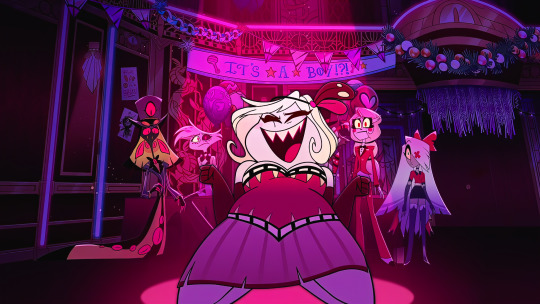
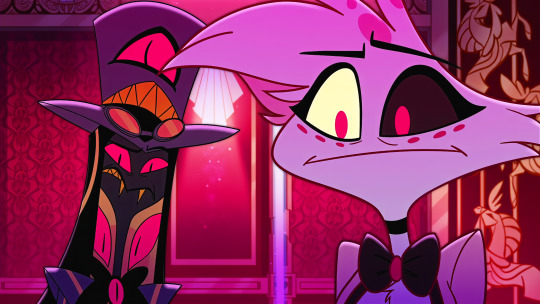
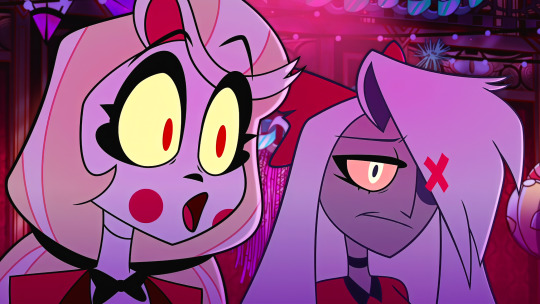

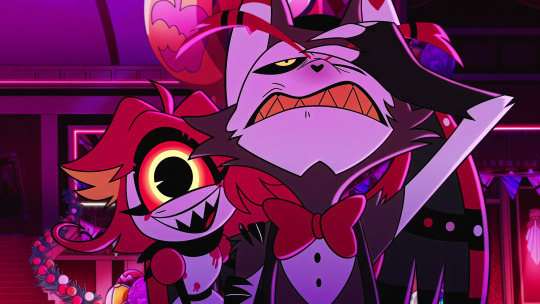
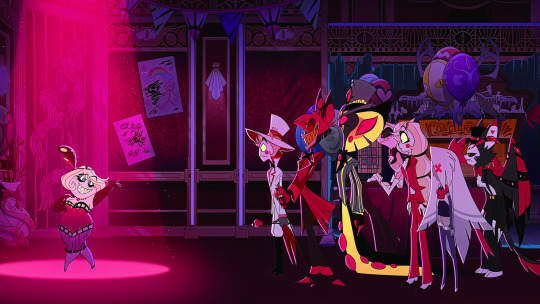
HAZBIN HOTEL (2024): 1x05 - "Dad Beat Dad" ↳ Everyone's reactions to Mimzy's showstopping entrance.
#hazbin hotel#click for better quality#hazbin hotel edit#hazbin hotel screencaps#lucifer morningstar#charlie morningstar#mimzy#angel dust#screencaps#sir pentious#vaggie#alastor#husk#niffty#hazbin mimzy#hazbin charlie#hazbin angel dust#hazbin lucifer#hazbin sir pentious#hazbin vaggie#hazbin alastor#hazbin husk#hazbin niffty#hazbin edit#dad beat dad#episode highlight#ep highlight: screencaps#yeah... i guess i'm doing this as part of the blog now lol#but i've been wanting to#putting it under the edit tag because they ARE edited - i used the coloring/editing techniques i use for my gifs :3
253 notes
·
View notes
Text
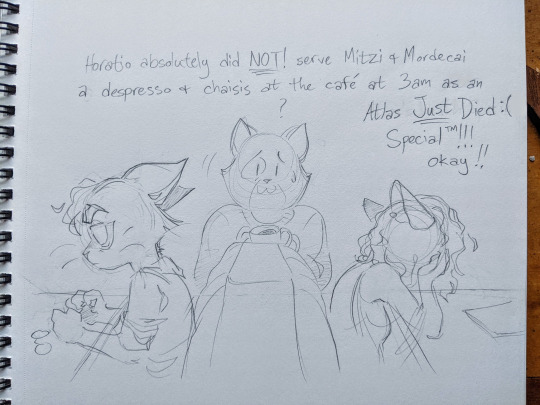
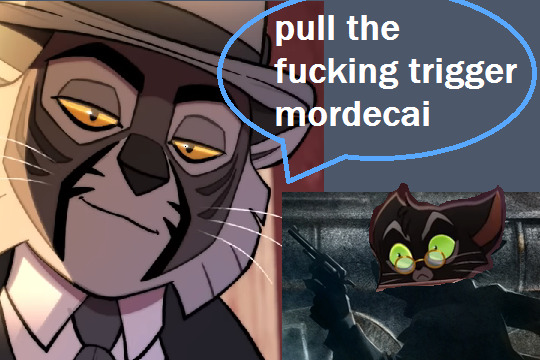
imagine...
...that some things have changed (including some marigold ventures?) and Atlas May is like uh oh both lackadaisy & i are doomed, but if i set up my own death maybe only i'll be doomed and lackadaisy might have to shutter but perhaps more so on involved people's terms, such as mitzi being fine financially, but also if she thinks it's her fault that'll be good for maintaining my posthumous Image to her, perhaps she did some defrauding again? and i'll have mordecai, my trusted & effective gunman, be the one to fatally shoot me, & of course he doesn't want to, but it's Mere Work Ethic time, what's he gonna do besides argue at all maybe, ultimately refuse? (no) and he may hate it but he's not going to want to fully turn on mitzi or anything after because then what would have been the point
#the power of images to incoherently posit my Ideas#can't be concise but Can frame this completely with What If Atlas Did This Thing#if i start with ''so mordecai killed atlas'' there's no time to be like ''not cuz he wanted to; yeah no he wouldn't betray him;'' etc#but see: my tag:#mitzi and mordecai murder mystery#lackadaisy#mitzi may#mordecai heller#i bet that horatio absolutely did not ever do that. chaisis is trying to be a play on crisis btw#bristling fugue moments? don't try to verify it#for the life of me i couldn't find that one specific edit that ends with the ''I Want To Dream....'' dialogue doesn't it lmao. nevertheless#kind of what i meant to make when i ended up drawing Lackabowling & mordico. nicodecai. mordenico. you understand#not sure anyone can understand i'm trying to convey ''if mordecai had to noscope atlas (from afar i bet) a second would pass Very Slowly#from his perspective. how useful if he even has clock sound effect leitmotifs established'' or anything else. have fun be yourself. Post!#corned beef#(ha only now do i remember ''that's completely ambiguous whether it's a second or minute hand'' zoinks#oh well: A Second Feels Like Fifteenish or Mordecai Is Just Standing There Emoji For A Full Minute....either way i guess)
69 notes
·
View notes
Text

#wind breaker#wind breaker (satoru nii)#haruka sakura#i am NOT tagging every other character#hey guys. did you know JIS colours are standardised for print? guess what they're not standardised for#''is it web orewing'' IT'S FUCKING WEB#so yeah if any of these are weird it's either bc i couldn't find a JIS reference or bc i had to pick from one of FOUR DIFFERENT RGB OPTIONS#and trust me. i TRIED to keep it consistent#why did i do this? bc i'm procrastinating working on my fic for wbk week. don't look at me#edit: of course they'd announce new merch with the image colours the DAY AFTER I MADE THIS!! so i updated it#fuck my stupid baka life
31 notes
·
View notes
Text

finished season 2, i'm so glad doomsday wasn't real!
[ID: a digital doodle of the tenth doctor and rose tyler from doctor who. they both have their arms wrapped around the others shoulder and are holding hands with big, goofy grins on their faces. END ID/]
#DON'T TALK TO ME I'M REALLY NORMAL RIGHT NOW#already mourning the loss of nine and now this???#fuck my gay life. happy pride month to these two weirdos specifically#dw#doctor who#tenth doctor#rose tyler#yeah i'll tag them! why not!#ignore how wonky my tenth doctor may or may not look..#still figuring out how i wanna draw him#his hairs a little too long but i don't feel like editing it rn#oh and#dw spoilers#i guess?
28 notes
·
View notes
Note
Hello hi howdy ! Fantastic episode of Scientific Eclipse and his great family, it was a caress to our souls after all the anguish they made us suffer! You are someone cruel, but at the same time thank you uwu
Although I hope we are not getting close to the end? I will be very sad when the best part of my Saturdays, which is reading this story, ends, so I hope there are still things to read and enjoy from this fantastic family
Ayy, Moongleam the author here, hacking into the account again (*^▽^*)
First of, thanks for liking my story! I'm honestly surprised by how much love it's getting, and blown away by all the love shown for it.
Also yes, thank you, I'm very cruel and evil U_U
You are pretty perceptive! Yes, THIS book of SEA only has a couple more chapters left, but fear not! I'm already writing a second book, which bit of a tone shift but I always wrote first for myself and I'm brimming with ideas for it so eh, and I plan to have little oneshots for SEA! It will be a series, especially because I won't start posting the second book until it's done, which might take a while. Currently I'm more focused on other projects, like a little Halloween special I plan on finishing and posting in the next couple of days, or on stuff like Watchful Nightmare, which is going to have a crossover with SEA because I was kinda given the idea for it. I also have my first ever TSAMS AU and thus fic idea to write, which will be called For You when I get around to it. That will also take a while, because it's kind of an ambitious and giant project, involving many AU ideas like the first iteration of the SCP AU, which is completely different from SEA.
So in short, yepp, SEA first book is ending soon, but the story itself won't :]
#OurEssays#the sun and moon show#sun and moon show#Scientist Eclipse's Adventures#would anyone believe me if i said SEA is actually a working title i gave the fic because of desparation and no other ideas for fic names?#i suffer greatly with naming things#and summarizing things#like the hell i'm supposed to describe my fanfic about an alien au which is also forced adoption and an idea i was given by a comment?#but no matter#it ain't broke don't fix it#i just rambled about a bunch of things in both the text above and the tags#i'm sorry#but yeah#SEA first book ending gets closer and closer#i should edit it to show it'll be part of a series already#EclipseWrites#i guess#tsams au i guess
13 notes
·
View notes
Text
hello internet users. this is a fandom discourse vaguepost. whoopee!
i'm not a fan of this topic because it makes me anxious any time it's brought up
but i want to just get it out there that i don't really give a shit about fandom discourse. i have an extensive blacklist for my squicks and i do go out of my way to avoid interacting with people who post about them a lot. but i don't predicate my every interaction with a background check, and i don't actually care what people do behind my back. if i don't have to see that, it's no longer my problem. i try to keep my blog as clean as possible for me and my followers and i think that's all i need to do tbh.
i don't have an issue with people who think differently about this, but i don't want the expectation that everything i post is extensively background-checked. disclaimer: sometimes it is, sometimes it isn't.
there's enough shit going on IRL, that i want to make it clear that fandom discourse is not something i take as seriously as a lot of y'all. if there's something i do post that you want to be tagged, i'll do my best to make that work (as long as it isn't like... undertale itself. i can't do that haha) but i really don't want asks 'warning' me about people i follow or people i'm friendly with, unless they're committing harm to people. (i appreciate that you care, but it makes me super anxious.)
tl;dr i don't care who i'm friends with, because i can't only talk to people who agree with 100% of my opinions. even if sometimes i prefer it.
#blast babbles#i'm not gonna tag this i'll just hope the keywords in the post itself are enough to get this to whoever is interested#you can probably guess which squicks i'm talking about#but i dont feel that the details are super relevant#i'm down to discuss this more if for some reason anybody wants to; if you're chill i'm chill#otherwise ignore this whole thing i want to forget about it immediately after hitting post 👍#oh yeah btw somebody did ask me to tag undertale once. it was like the only ever time somebody requested that i tag something#and i had to politely decline 😔#edit#did i accidentally make this in an essay format. squints
5 notes
·
View notes
Text
not even gonna tag this properly bc i don't wanna get Involved but i do have some Thoughts i need to get out into the void so here we go
(aaa quick edit: CW for mention/discussion of Boothill leaks)
#today's gone Badly and i'm upset but instead of venting abt it i'm gonna channel that energy into doing a bit of tag rambling abt Boothill#well. less abt Him and more abt uh. self-analyzing my anxiety surrounding contributing to fandoms. he's just today's catalyst#like. i know it's mostly a me thing. i'm hypersensitive to criticism and very conflict avoidant + socially anxious + perfectionistic etc.#so I'm the one that keeps myself from posting more stuff out of fear of being criticized or called-out for what i've made#bc inevitably Someone's gonna see it and think its OOC or a problematic take or they'll misread my intent. etc etc what have you#but like. that's inevitable. there's no way to communicate every single thing with all of the nuance required to avoid misunderstandings#and other times it's not a misunderstanding it's just a difference of opinions and that's Fine!! there's no accounting for personal taste#there's no accounting for several things actually. taste‚ bias‚ lore-knowledge‚ differing levels of chronic-online-ness‚ etc#so this isn't me complaining abt the state of fandom culture (although i do think. sometimes. ppl take shit a bit too seriously)#but anyways all of this is mostly just anxiety-fueled. it's not like i very often actually even receive negative feedback or anything#if anything ppl tend to tell me that i'm overthinking it and killing my own fun and worried that my stuff is more OOC than it is#which like. yeah. Yeah u right :) but that's just the way that i am! always losing the idgaf war i suppose#anyways what's Boothill got to do w this ur wondering. well. i've been thinking abt the quickly emerging concept that he's illiterate.#and it just. has me feeling a lot of ways. and watching ppl disagree over it has me feeling some Bad ways. bc it's def a loaded topic!#if you'll pardon the pun there. and i don't rlly have anything new to add other than that i'm conflicted abt it.#like yeah i saw the leaks days ago. of him mentioning 'not hitting the books' much as a child when we ask him why he sends voice messages#or voice Transcriptions ig. ykwim. and like. *braces for impact* ...i liked it? like. it doesn't feel right to call it endearing#i'm not trying to infantilize him. ok that's not the right word either but ugh. you know? what i mean?? who am i kidding even i don't know#it's not quite right to say that it feels like Representation either. but it's something close i guess#as a southern person myself who didn't receive a 'complete' education due to factors that weren't to do with my intelligence#the concept of seeing him as a capable force to be reckoned with and respected who also happens to have not received much formal education#i like that. i do. but there's so many issues w it at the same time. like. as i said‚ being southern myself has me Wary of the way Hoyo is-#writing him. as well as of the way that the fandom is taking the bits of his lore and running away w them. and i'm Very aware of how ppl-#will see a southern character and be All Too Eager to agree that they're lacking intelligence based on our Redneck™ stereotype#sigh. and before we even go too far with this. it's not even confirmed that hes completely illiterate. which is a valid criticism i've seen#there's Multiple reasons that could make him prefer voice to text. but regardless. i'm just worried that ppl will misconstrue my intentions#like. example: that edit i made the other day of him saying 'no thanks i can't read'. wasn't me playing into the stereotype of-#'haha dumb country boy can't read!' it was. in my eyes. something he'd say as a joke to make light of a potential insecurity#like. i think there's far more depth to Boothill's character if ppl could look past the surface. and i dont wanna contribute to the problem#but sometimes ppl Will have stereotypical traits and i wish the same could apply to characters as long as it's done Thoughtfully.
13 notes
·
View notes
Text
Currently watching this very cliche (but still decently enjoyable) Christmas movie and it has this horse girl subplot where the older sister is falling in love with horses, but there are these long, lingering shots where she's looking at this female farmhand working with the horses, and she keeps talking about how great and cool that farmhand is, and I can't decide whether it's actually a burgeoning lesbian subplot or just a heavy accidental implication, but it really does feel soooo close to overtly romantic.
Anyways my hot new ship is these two. Time to build it from the ground up ;)

#All Good Things (2019)#Christmas movies#it's so heavy handed but I'm not sure they realize it#tale as old as time I guess#also there's apparently a completely different movie also called All Good Things from 2010 that keeps dominating the search results#but yeah still watching but I'll let you know if anything actually comes of it#tempted to make a sappy video edit of them together either way but also that'd be a lot of work#maybe not building the fandom singlehandedly then but putting it out there that they're cute#Christmas lesbians#or bis or whatever#maybe it's the shipper goggles but how long do you spend staring longingly at your friends?#anyways#'tis the season#Merry Christmas!#I ramble#I should tag the characters but I already don't remember their names#Callista and Fiona#thanks imbd#no last names though#I don't think I feel compelled enough to write a fic about it but I like them#also Shawn's dad from Psych is in it!#some pretty flat acting here and there (not from him) but par for the course in this genre
13 notes
·
View notes
Text
ok so. kiwami 2. rooftop scene. the ending. it's a bit of a clusterfuck but i wanna talk about one detail, a problem they bring to your attention by Fucking. Talking About Her.
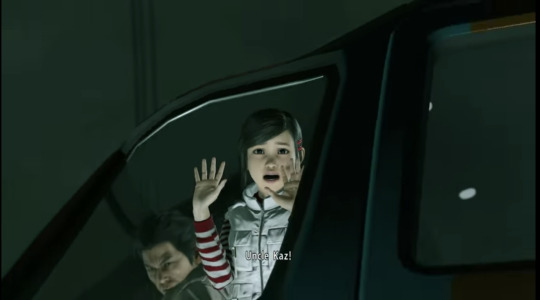
haruka is watching all of this unfold.
[this post is like 4.5k words long + pretty critical + has spoilers for kiwami and kiwami 2, and really minor/vague ones for a couple others. they're not that bad though, trust me (and i added a warning in the one place it is major)]
ALSO CONTENT WARNING i'm gonna talk about kiryu's passive suicidality a good amount in this one, so stay away from this if you think that might affect you negatively/you'd be better off skipping it. i'll also make a tl;dr (which i will highlight in red) at the very end if you really wanna know what my point is that will exclude those elements <3. i am also going to use a lot of choice-based language in regards to kiryu's contemplation of suicide because i think it's the lens through which the games treat the topic, but i personally don't find it a productive or realistic way to look at suicide or suicidal ideation at all. someone dying by suicide absolutely does not mean they don't care about their loved ones enough to fight on or whatever. i love you, and proceed with caution on this one.
(also i'm using the kiwamis as my point of reference because i uh. don't have a ps2? those are the games that i played, and though the differences are likely slight, i wanna be clear about that. also,, ignore the watermark on these screenshots,, i didn't notice them and i'm not retaking them. we're all gonna have to settle for youtube cutscene comps for now xoxo)
first, we have to talk about the ending of the first game.
[note: i am Really Really Confident kiryu has a conversation earlier in the game about his going to jail in nishiki's stead being him running away and choosing not to resist his two options (go to jail or let nishiki go to jail) and define his own path, fighting his way against fate to make it happen. part of why i'm so confident it exists is because it made such an impression on me at the time. it's pretty important to my interpretation of things but i also can't find it for the life of me, so uh. sorry ✌️ i really tried. this post's takes/analysis will be dependent on this scene existing, so keep that in mind. if anyone knows where to find the scene/screenshots of it, lmk and i'll add a follow-up with it]
kiwami stuff
so as she's dying, yumi tells haruka this:
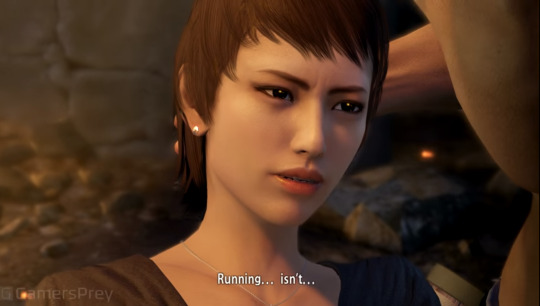
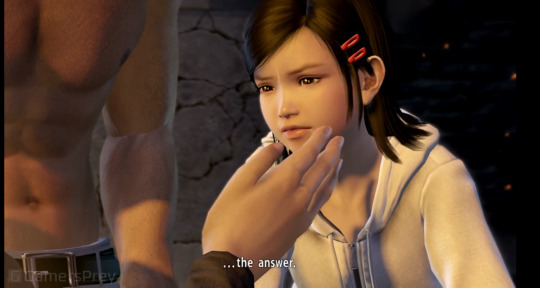
that she may be dying (painfully, and right as she's getting everything she wanted), but she doesn't regret it, because at least she did something rather than running away from it all. that you shouldn't run away, ever.
shortly thereafter, when the police find kiryu and haruka, this exchange happens between him and date. here's the play by play:
date tells kiryu he can get him out of trouble with this, and that if he doesn't, he'll get life in prison; kiryu declines his help:
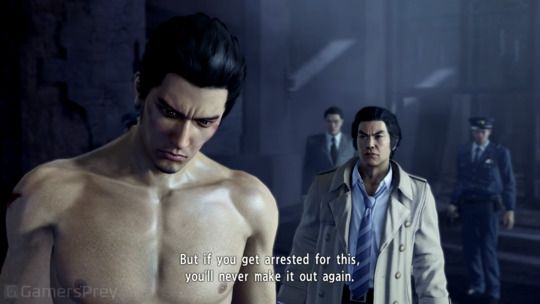
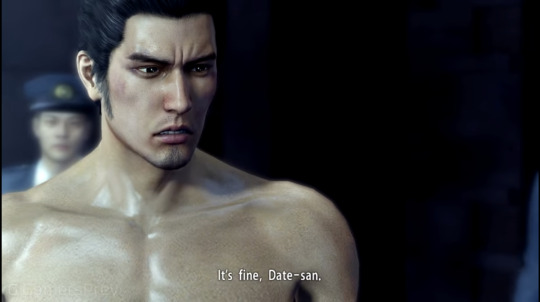
kiryu is so devastated (understandably) by the back to back losses of the three people closest to him that he resigns himself to life in prison, and the death-in-effect that would be. he would prefer to waste away rather than struggle through a life without them. prison was monotonous and isolating, but coming back after a decade was overwhelming, and coming back to everything being so warped and twisted, and then losing the corrupted scraps he had anyway, well. he wants to go back to sleep. he doesn't want to be in a world where everything's the same except he's on his own. better to return to safety, to die slowly in a hell he knows well than weather a new one where he has control and agency, and thus one where he has the ability to fail and to lose anything at any time. he explains to date that that loss is why he can accept his death:
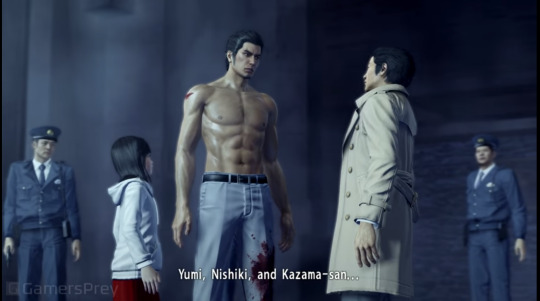
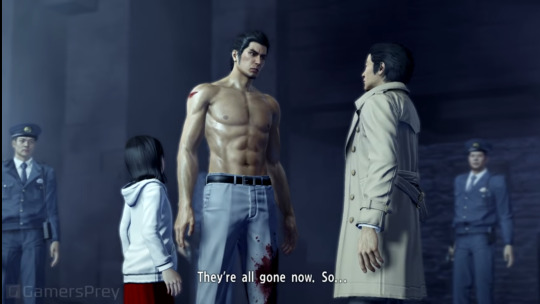
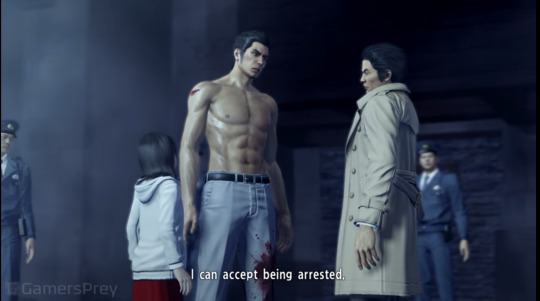
date shakes him and asks him if there's really nothing left for him, no reason to keep living at all:
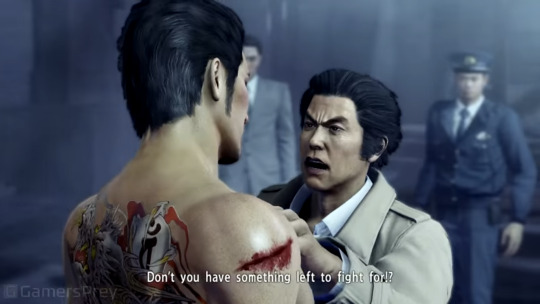
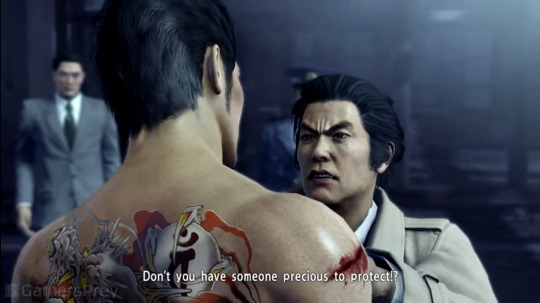
then echoes yumi's advice to haruka:
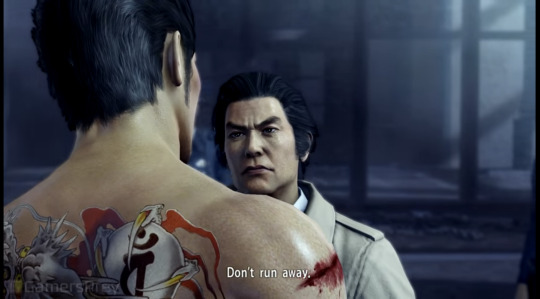
which makes an impression on kiryu:
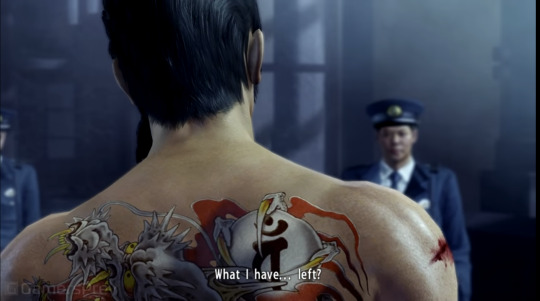
date gives him a reason to live in the form of haruka, saying she'll be on her own again if he goes to jail. he hijacks kiryu's tragic protector complex to keep him alive, because she needs him, and because she's someone precious to him:
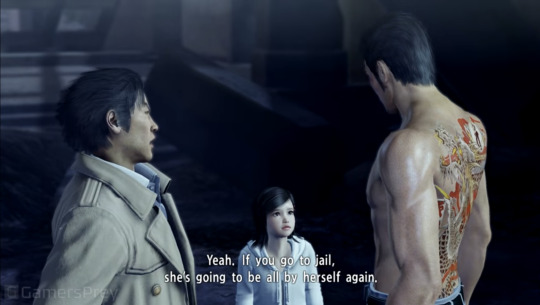
after the dust has cleared,
kiryu and date also have this exchange, where date tells him to stay away from the cops (and presumably arrest and a return to prison, the aforementioned fate akin to death), and kiryu cites haruka as his reason to stay away, one he holds to with no uncertainty (showing again that he's accepted date's logic, that his reason to keep living even when it's incredibly difficult is to care for the more vulnerable haruka). given the weight of the consequences, to me, it feels like date's telling him not to be alone with his thoughts or something. it's almost frightening:
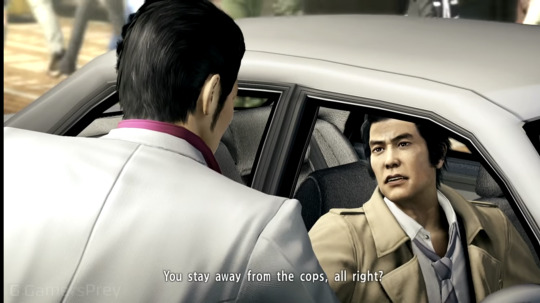
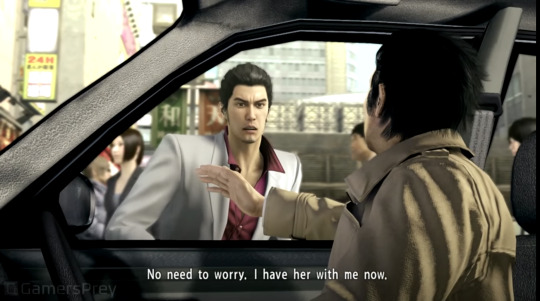
so, what's our takeaway from kiwami?
kiryu lost everything and hit rock bottom, but he chose to fight, and to live life on his own terms, even when it got difficult. that's the narrative life lesson he had to learn to avoid repeating the events of 1995. he made that choice for haruka's sake. it's seen as growth.
and without him, haruka would've just returned to the orphanage (assuming she could make it back to sunflower at all) with no one who knew or understood what she had been through, no one to mourn with her, and no one to give her the attention, care, and protection she needs. kiryu knows what it's like to be an orphan with a limited parental figure who only checks in every so often (kazama, "aunt" yumi), and what someone will do for attention/affection from that person (via both himself and nishiki swearing up, climbing the ranks, etc. arguably haruka coming to kamurocho by herself to find "mizuki" is similar), and what it's like to lose them anyway (again, kazama, yumi). their situations parallel each others' somewhat, and that binds them further. and after losing everyone (which he blames himself for to some extent, as one can probably assume from this and 2, and something key to his arc in later games), he chooses to protect her. and this time, he won't fail. at least partially because failing would hurt him, too. he'd have nothing left again.
okay. now we get to kiwami 2.
if you forgot, the context is basically:
everybody's fighting on the roof of a building which i'm sure will not be a running theme or anything as the series goes on
there's a bomb that's about to go off and they don't know how to/can't defuse it
ryuji shot the twist villain to death, but took fatal hits to do so
sayama's like hey!! let's get out of here!!! and kiryu and ryuji are like nooo we have to settle this oughh it's punchin time and they stick her on an elevator and send her down so she doesn't have to watch
ryuji loses. sayama returns, they have a cute sibling heart to heart, and ryuji dies in her arms. sad
kiryu is in rough shape as well, and there's like 2 minutes left on the bomb's timer
here's the scene itself:
sayama tells kiryu they have to run, and kiryu says he can't. the gist is "let's run!" "you go without me" "i'm not leaving you!" "i'm in no condition to run" "i'll carry you then!!" sayama: *sees how fucked up kiryu is, realizes he's Going To Die Anyway* "ok, then i'm staying with you!" and then further bickering about that, before they give up and make out (as one does i guess)
date (he's here now) yells this at them from a helicopter:
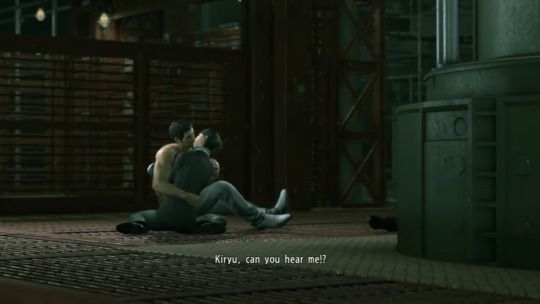
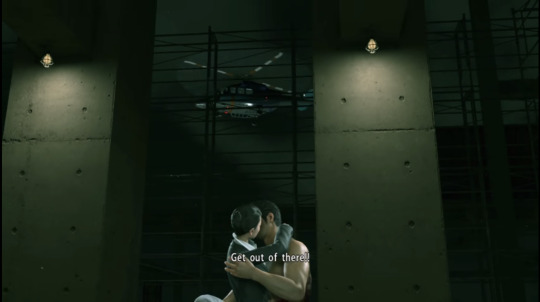
before someone else in the helicopter tells date this:
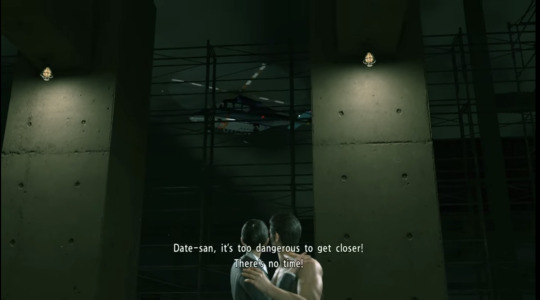
we get this shot of haruka calling out to kiryu as the helicopter swerves away:

and kiryu and sayama have this exchange about haruka where they say they let her down, but that she'll understand:
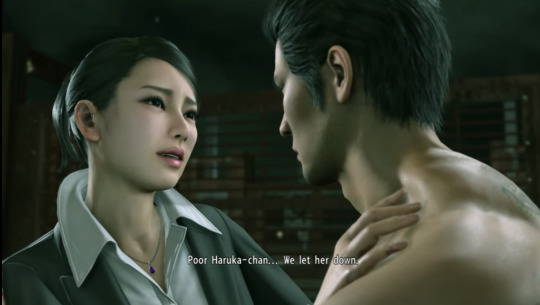
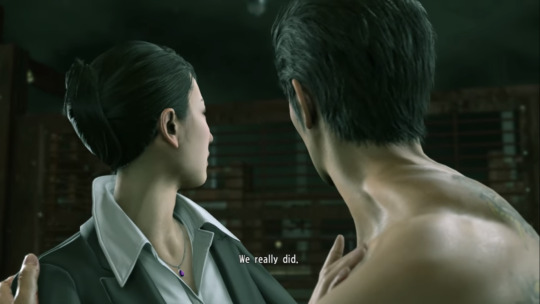
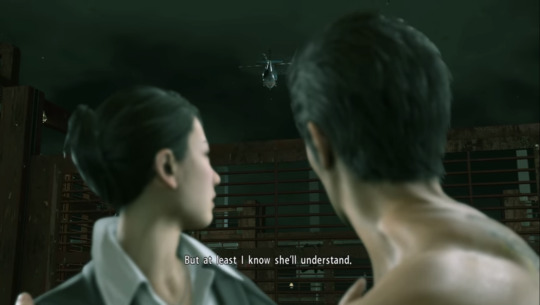
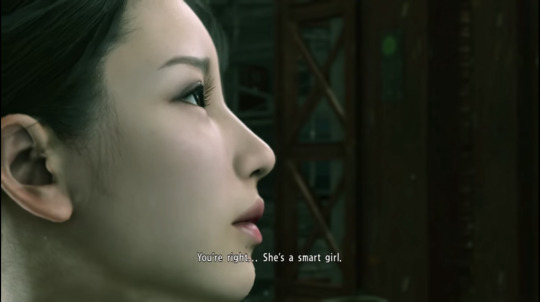
then they hug and the bomb ticks to zero right when the credits hit. in post credits it's revealed that the twist villain defused the bomb when they weren't looking, betraying his co-villain for reasons i truthfully do not remember and am unwilling to look up. it's not about that right now.
so, how does this scene interact with the ending of the previous game?
the short answer is "badly <3" but here's the long answer:
it's about choices.
the thing about fiction is that anything you want to have happen, as a writer, can happen. it may not be effective, internally consistent, or logical, but you can write it regardless. audiences suspend their disbelief for the sake of engaging fully with your fiction, but everyone has a threshold past which they will stop being engaged in a story and either become uninvested or annoyed. writers usually have lines they're unwilling to cross as well. but in almost every story, there's at least a couple of places where they stretch reality a little to make the narrative they want happen. this is not a bad thing at all. that's how stories get told.
now, i'm gonna be real with you. i don't care about how feasible plots are like 95% of the time. it's not something i think about much, nor is it something i prioritize. i am a very character-centric media consumer, so if world building and/or plot are a bit stale or contrived, that doesn't really bother me much so long as i'm invested in the characters involved. some people can't stand plot holes or the ways musicals burst into song or whatever, and that's fine for them. but it's not something i tend to find that all that important.
this is all to say that i have a sorta affection for rgg's flavor of bullshit pulling. and it is a powerful flavor, maybe even an acquired taste, but i can and do rock with it so long as it doesn't damage the characters too much. this is why i'm not making a lengthy post howling into the void about joji kazama or the second joon-gi han or how many secret relatives there are. those things are silly and endearing and a clumsy yet heartfelt part of a series i care about very deeply. i'll joke about it, but i don't consider it much of a flaw. it's more like personality. flaws are texture, and they help a piece's identity. point is i am very, very willing and able to suspend my disbelief for these games in exchange for a good time, particularly via good characters.
(if you want another example of where i draw the line from within rgg, the answer's the YAKUZA 4 SPOILERS INCOMING rubber bullets twist, because i think 1) it's actively horrifically stupid (especially retconning a scene we SAW HAPPEN. WE SAW BLOOD ON EACH IMPACT, AND RUBBER BULLETS DON'T OFTEN BREAK SKIN THAT DEEPLY (THEIR DAMAGE IS MORE PERCUSSIVE THAN PENETRATIVE). THESE EVENTS HAPPEN IN THE SAME GAME YOU DON'T HAVE TO RETCON IT JUST REWRITE IT. OR DON'T SHOW THE HIT AT ALL SO THERE'S MORE PLAUSIBLE DENIABILITY. DON'T DO THIS JUST TO HYPE UP YOUR SHITTY VILLAIN NO ONE CARES ABOUT. and 2) (a bit more importantly) i think it actively removes saejima's primary internal conflict for that game, that being his intense guilt over the 18 murders he thinks he committed, one i was invested and interested in. but this isn't a rubber bullets post.)
characters in this series walk off a lot of life threatening injuries. they survive miraculously, they escape in the nick of time, and they pull through in the end. kiryu still somehow hasn't killed anyone. almost every game in his saga ends with an "is kiryu gonna make it out this time?!?" shortly followed by a "yeah lol. lmao" postcredits reveal. kiryu fucking punches a marble statue into dust in the first game. having a story that asks you to suspend your disbelief so much and so often means that when a decision is made, it's not the writers saying, "well, this would have to happen so we are obligated/forced to write it happening" so much as "we wanted this to happen for some reason(s)," because you already know that they're not guided solely by logic. again, this is true of all writers, it's just amplified in stories like these because they've already given you so many hard mode suspension of disbelief moments (they've broken you in like leather, yeah? or like how obvious internet scams allow for self selection by being so obvious that only the most vulnerable people would fall for them. they curate an audience willing to play along with their bullshit flavor so they can tell a story that's more likely to satisfy that audience. in a good way, in a fun way! mass appeal is overrated). there is not much limit to what this series is willing to try and sell you.
so when ryuji takes lethal damage taking out the big bad, that's a choice. when he doesn't die immediately, that's a choice. when ryuji and kiryu send sayama away in the soon-to-be-forgotten elevator so they can settle this like men or whatever despite the literal actual bomb about to go off, that's a choice. when sayama comes back, that's a choice. when ryuji does die, that's a choice. when kiryu determines that he can't escape in time, that's a choice. when sayama is unwilling to leave him, that's a choice. when she says she'll carry him out and there's an elevator right fucking there and then she's like never mind i guess i won't anymore we're dying together right now kiryu like they're not gonna even try?? wouldn't distancing themselves from the blast give themselves a better shot, something that's super possible given the 2 minutes they have with that elevator??? sayama you met him like a week and a half ago why are you ready to die with him that's not a plot hole i just think that's kinda strange whatever anyway, that's a choice. when kiryu stops arguing with her so they can kiss (next to her brother's corpse), that's a choice. when date shows up, that's a choice. when the helicopter can't save them because the bomb was going to go off too soon, that's a choice. when they put haruka in that helicopter and take her away, let her only impact be reminding kiryu and sayama that they can't help her, that's a choice. when they spend their last moments talking as if they're already dead, then simply waiting, that's a choice.
they're all choices that the writers made for the characters, and we are asked to believe them for the sake of achieving the writers' vision, as with any story. the only problem is that the writers' vision here fucking blows.
i'm not saying it would be realistic for kiryu and sayama (and even ryuji) to make it out alive, but it wouldn't be out of character for the series in the slightest. kiryu is suddenly unable to power through here, and that's a choice. so, what is their vision?
put simply, i think they wanted a romantic last stand for kiryu and sayama, a tragic scene of doomed, devoted lovers. and i think they wanted an edge-of-your-seat fake out death. they wanted spectacle.
here's how some specific choices they made undermine all that shit we talked about earlier from the first game.
once again, kiryu is called by date to live, to pick himself up and keep going, no matter how impossible the odds are. he's even reminded by haruka's presence, his one anchor in keeping himself going. the growth he had in the parallel scene in the previous game is challenged, and he fails.
it's not enough this time. and that's a choice.
it's also one i can't think of a good reason for, and that's the real kicker.
characters can have developmental backslide just like people do, and if they're given good reason for it, it can be just as, if not far more compelling that purely linear growth (i am a chimera ant arc enjoyer, and that's all i'll say. sorry if you haven't seen hunter x hunter. uhh. i am also a zuko avatar enjoyer if that helps). but i can't think of anything that happened in that game that would cause this from a character perspective. if anything, kiryu should be less likely to do this intentionally. he's spent around a year raising haruka, and a year has passed since he lost his loved ones. at the very least, the pain should be more dull, though it is established through an early nightmare sequence that his ass is (justifiably) not over it yet. given that their deaths were the initial motivation for his willingness to rot forever, theoretically, he should be more motivated to stay alive than before now that he's got more investment and stability in his life outside of them, particularly when it comes to haruka, his reason for surviving. and if the ongoing nature of the trauma was the motivator for this, then they should've had it affect him more past that nightmare scene (it really serves more as a recap of the last game than anything else) so it didn't come out of nowhere. so the reminder of the lesson that saved his life and then guided it for at least a year afterwards, one that the whole resolution of the previous game relied on heavily falls flat for... some reason.
i think this is a good time to mention that, generally speaking, you don't write arbitrary choices into characters. sure, people in real life are often sporadic, but when analyzing fictional characters, every choice is filed into a portfolio of characterization that can and should be analyzed. going for pure realism can obfuscate their development, motivations, themes, etc. their choices and reactions may be unorthodox, but they must be internally consistent. this is very related to how i view plot contrivance as well. characters drive the plot, not the other way around. stories are about the ways characters affect their worlds/lives and vice versa, and they're the human face to the themes and ideas the writers are trying to explore and express. maybe my stance on this seems hypocritical. i don't know if it is. but to me, plot issues are usually a matter of engagement and investment, while character issues are a matter of substance.
i hope this doesn't feel patronizing explaining all of this, but i want you guys to know where i'm coming from in my analysis. starting at my base philosophy on writing is the easiest way to do that, i feel. defining the terms of the debate, and all that. anyway
and i mean, look. they survive because "it was defused the whole time we just didn't see it happen", so it's not like narrative tension or realism or whatever was THAT big of a priority overall. if it was gonna be a cop-out anyway, they should'nt have ruined kiryu's development too, yeah?. and sayama fucks off to america after this game anyway, so it's not like the doomed lovers thing had much payoff or meaning after this one (though you could argue that's more an issue with yakuza 3 than yk2, which has some merit to it). which means that they chose to sacrifice kiryu's prior development and internal logic for the sake of cheap tension for their finale that was both kinda illogical in and of itself (the elevator!! the elevator!!!) and a romantic climax that neither required nor really benefitted from this staging. (like. you coulda had them make out and then get saved by date, or kiss on the elevator in a "it's moving, but will we make it in time??" way or whatever. look i'm not saying those are great options either but they're SOMETHING okay. it would remove/reduce the amount of time wasted on characters sitting around with their thumbs up their asses for no reason in this finale).
instead the message of this finale is that, actually, sometimes it is impossible to change your circumstances and fight for your own way out of an awful situation. and what should you do about this unfortunate truth? uh. die! i guess. it's the exact opposite of the encouraging, optimistic message of the last game. zetsubou chou pride my ass.
note: i feel i should mention that when suicidality is brought up within the series (particularly in substories), it is always something someone has to overcome themselves through wanting it badly enough. they simply need the inspiration and the motivation to keep going. it's arguably treated as a moral obligation. frankly, the series is broadly very meritocratic (<- bad) when it comes to this topic (and others, but that's a Whole Other Thing. see akiyama's weird loan shark tests as well). sheer will and resolve is enough to conquer any problem, be it physical or mental/emotional, and it's irresponsible to act/feel otherwise. this is the logic the games operating under, and kiryu is often the mouthpiece for this bootstrap-pulling "tough love" sentiment. so when kiryu "chooses" to die, yet faces no emotional fallout from date, haruka, or anyone else, it feels very out of place. it's not just an odd choice; it's specifically, once again, an odd choice to make in context of the game/series/character it appears in.
kiryu's just like eh, haruka'll watch her only family die right as she gets some sense of tentative stability and lets her guard down after a devastating month the year prior (and a relatively dismal upbringing before that) that we trauma bonded over. sure, she likely came to view me as the one who would stay no matter what, who was too strong to be taken out, who she could always rely on, and so i know that dying would hurt her immensely, but she's smart enough to know it'd happen eventually. her eventual recovery means it's okay for me to do this (somehow, in a way it wasn't in the first game). it's an excuse within the narrative's logic, and one it is uncritical of simply because it's kiryu. he gets a pass.
and i think with the previously mentioned passive suicidality and general series-long mental health issues kiryu displays (i mean. yakuza 5's literally his depression arc), this could be retroactively seen as an interesting choice, like a piece in that particular narrative. i don't even dislike that viewing, especially in terms of fan approach. but (assuming this went down the same in yakuza 2), they likely didn't have that in mind. all they had then was the first game and the movie. and they took the first game's Entire Message and contradicted it for nothing but a scene they wanted to have happen because it'd be suspenseful and/or emotional (without actually doing the work to earn it). and they're not fans trying to analyze his character, they're the ones making choices for him. and they chose to massacre my boy. and if the subject of kiryu's mental health was a priority of theirs, why didn't they explore that? haruka and date's feelings on him not resisting and their words not being enough (whether that blame is justified by the narrative or not (it shouldn't be btw)), the uncomfortable drifting that resigning yourself to death and living afterwards anyway often brings, literally any conversation about it besides the minimal shit we get post credits of date being like "did you know about the bomb not having a fuse?" which like. bad answer either way (which is why they weren't straightforward about it, the cowards). you can't just be like "oh uh. idk he just gave up this time. yeah he was gonna die on purpose for some reason. good thing the bomb was fake lol" and then pack up and go home!! that's stupid!! any merit the idea of kiryu dying by suicide in this scene and in this way could have had from a character-based perspective loses its weight because 1. it didn't happen (for kinda stupid reasons), which makes it fall flat and 2. no one is really affected by the fact that it almost did, including him. they sacrificed his ass and replaced it with nothing, even when there could have been interesting outcomes to it.
so the narrative effectively chose to kill him by making the situation impossible, and this impossibility is ultimately arbitrary, given the series' usual approach to miraculous, illogical escapes. that, or the choice to stay was up to kiryu and sayama, one that 1. doesn't make sense and is actively regressive in context of kiryu's arc in the only other game in the series (as well as his whole saga in retrospect) and 2. one that contradicts how the series sees/treats resignation to death/death by suicide in all other contexts without being addressed, challenged, or condemned in ways it would in all other contexts. because they don't want you to think about it like that. they want you to think he (and the narrative) had no choice, that it made sense to do that. but it didn't. it doesn't.
and look, honestly? if i was bleeding out and had like 2 minutes to live, there's a non zero chance i'd say fuck it and kiss a girl too. i get it. but i am (and this is crucial) not a fucking yakuza character. and i'm certainly not kiryu kazuma.
tl;dr (basically just rephrasing the second to last main paragraph)
there are not sufficient character reasons for kiryu and sayama not trying to escape. additionally, because the narrative regularly facilitates even less likely escapes, it's not so constrained to logic and reality that it couldn't pull this one off. the choice to let their situation be impossible this one time was a cheap and arbitrary way of forcing a scene they thought would be cool and dramatic, and in doing so they chose to cannibalize a key emotional note of the previous finale (namely kiryu's mission to dedicate his life to protecting haruka) for hollow last minute stakes-upping in this one. it is then completely disregarded anyway. god damn.
#got so into this post that i used tumblr on my laptop for the first time to surpass mobile's image limit#i also added transcriptions in the alt text (which i should do more often)#actually thinking about it in the movie kiryu teaches haruka that lesson about stumbling on.. and she's the one to ask to follow him... hm.#just interesting given that the movie came out before 2. i don't think it makes much of a difference to the post it's just neat to me#one of my favorite parts of writing this was skimming through a bunch of yk1/yk2 cutscenes and noticing how often kiryu pats haruka's head#it happens a lot more than i remembered and it's very sweet to me. get bonked little one <3#another good thing was realizing you can edit tags when you're not on mobile.... fucking life changing. i have lost hours to mobile tag#editing and i'm not even kidding about that#speaking of editing this one took like 6 hours.. my brother used “yakuza autism” (verb) for me earlier and it's so true. source: this post#i did have a short break to get food bc i hadn't eaten all day but that's mostly because i woke up at 3pm. anyway#also if you like kiwami 2's ending you're not even remotely alone. i looked at the comment sections of the scene comps and ppl love it#and more power to you!! i like it when people enjoy things. and tbh i DO have feelings that i'm supposed to about that ending#i just also have feelings you're not supposed to. like. anger. i guess.#rgg#ryu ga gotoku#skrunk meta#aww yeah it's a new tag babeyy#yakuza kiwami 2#kiwami 2#yakuza#like a dragon#yk2#kiryu kazuma#sawamura haruka#sayama kaoru#maybe my thoughts'll change after replaying the games...? it's been like a year and a half since i beat yk2 so i am a bit fuzzy on it#yakuza kiwami spoilers#yakuza kiwami 2 spoilers
39 notes
·
View notes
Text
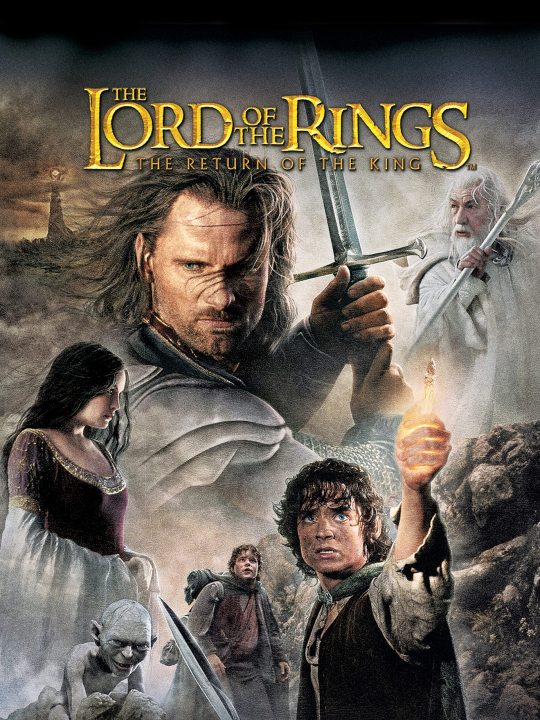
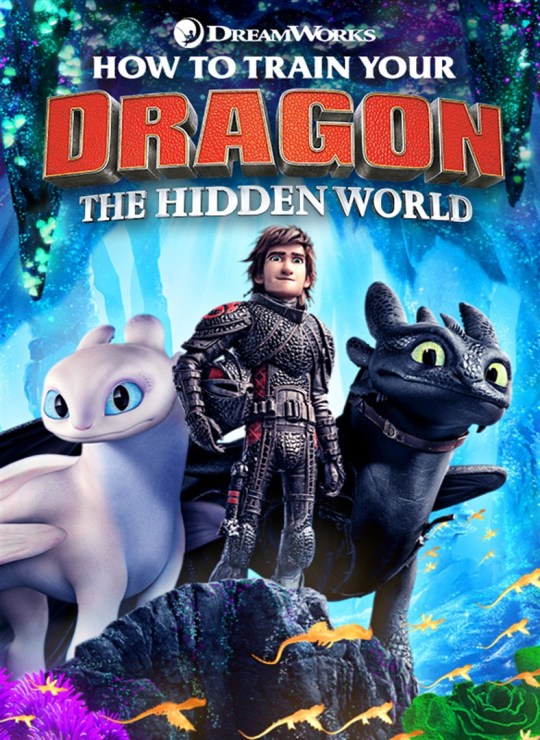
if i had a nickel for every time the best friend duo that was the cornerstone of an entire trilogy got split apart at the end of the 3rd movie, ruining the entire trilogy for me, i'd only have 2 nickels, but it's strange that it's happened twice
#BUT FOR REAL THO#the entire lord of the rings i kept thinking that sam and frodo were gonna get together#but i had to keep reminding myself that they're movies from the early 2000s based on books written in the 1930s (i think the 30s?)#so gay couples weren't an option#and then they just go their separate ways and i feel like the movie made it clear that they don't see each other again#and then httyd oH BOY#i understand why toothless had to leave i do#kinda#but the fact that the movie made it seem like “yeah it's sad but hiccup and astrid got married so it's not really THAT sad” is what got me#like ok got it lesson learned: all your friends will eventually leave you but it's ok cause you'll have a romantic partner for life#if you don't have a romantic partner for life well then i guess you're just fucked#it's this alloromantic Thing that society does where they treat romantic relationships as better than friendships and i HATE it#i cried for so long after i saw that movie#and the friend who i saw the movie with and who i was talking to about how sad i was#was like “i'm never gonna ditch you”#and then guess what you guys#she just stopped talking to me one day#hasn't spoken to me since#my post#ALSO I JUST FOUND OUT YOU CAN EDIT TAGS AFTER YOU HIT ENTER#SO YOU DON'T HAVE TO RETYPE THE WHOLE THING IF YOU NOTICE A SPELLING MISTAKE AFTER YOU HIT ENTER
11 notes
·
View notes
Text
30 Day Fictionkind Challenge Day 14
Q: What are shifts like?
A: Before I begin, I'm strictly speaking about my personal experience here, and in no way does this post serve as a universal definition. Think of this like a diary entry, not an encyclopedia entry.
Anyway, what they're like can vary wildly based on several factors. Two big ones are the kintype in question, and what prompted the shift. Generally though, a shift almost always comes with strong feelings attached, and in its own way, each shift feels like coming home.
Because this blog is for discussing my identity as Luca, I'll focus on that kintype. However, it's a bit hard for me to describe, because more often than not I'm in a Luca shift. I consider it more of a "default" state of being, for lack of a better term.
Anyway, how a Luca shift feels depends on what prompted it. In my personal experience, kinshifts are always prompted by something, and never come randomly.
Most of the time, shifts are prompted by music. Sometimes it's music that resonates with me lyrically — the words metaphorically "bring me back" to my source. Other times, it resonates with me melodically. The sound scratches my brain in a "Luca" way, and/or is a song I would've liked in-source. Sometimes, both the lyrics and the melody take me back.
Other common triggers include (but aren't limited to):
Lore drops (particularly about my backstory or time at the manor)
Any other official drops that I consider relevant to me
Fanart that aligns with my memories/noemata or otherwise touches me in some way
Analysis of my source that aligns with my own perception, or that prompts new introspection
Unrelated creative works that resonate with me from a Luca perspective
Random posts/memes on the internet I find relatable or that cater to my sense of humor
A common denominator among all of these potential triggers is that they are all callbacks to my memories and noemata. For example, my birthday reveal prompted a Luca shift, because it affirmed my suspicions about what my interests, likes, and dislikes were.
Another example of something that has happened to me several times is finding a song that reminds me of someone important to me, so I ruminate on my feelings and memories about that person, which prompts a Luca shift.
A final example I'll give is coming across a post on my dash that I feel captures my "essence" as Luca, so I sit and think about it and any specific memories or noemata it may have reminded me of. Or maybe I just find it relatable (or funny!) without necessarily being reminded of specific aspects of my source. Both cases can prompt a shift.
My response to the shift and how it feels depends on how I feel about the memories and stuff attached to it (positively or negatively). Generally speaking, whether my feelings are positive or negative, I'll probably feel pretty intensely going into it regardless, and spend the next while dwelling on it.
My negative memories/noemata associated with this kintype hold a lot of resentment and anger, so those are the most common emotions I feel during a shift prompted by stuff like that. I may also feel sadness for what I've lost or what I've been through. Or, I can feel frustration at what I didn't know then and don't know now. Feelings like hate, obsession, and grief are no strangers during these shifts.
Shifts fueled by negative emotions can feel like a stab in the chest, or sometimes it can get especially bad and feel like I'm burning from the inside. Either way, I like to make use of outlets so I'm not just stewing in it. Music is my main outlet, but I may also draw, write, or talk it out if I feel up for it. Redirecting my focus to something else entirely also helps.
From the outside, I might appear withdrawn and low-energy so as to not needlessly dump my problems on others, or misdirect my feelings. If it's nothing too serious though, I probably don't seem any different. Just preoccupied at worst.
My positive memories/noemata associated with this kintype...can honestly be few and far between (having a horror source is great /sarcasm). But, they still exist, and can still prompt shifts just like negative noemata can. Most of the time, shifts prompted by positive emotions are fueled by my love for the people I was close to in my canon (or even just amicable acquaintances with). There's not a lot about this source I can be wholeheartedly happy about outside of my cherished interpersonal relationships, so I can't think of any examples of purely positive shifts off the top of my head that don't revolve around my friends and peers. Maybe I'll come back and try to think of some sometime.
Shifts fueled by positive emotions can feel like a flower blossoming in my chest; it feels full, yet ticklish, like the petals are gently brushing against my flesh. It's comparable to the feeling you get when you're about to laugh. It can also feel like a spurt of energy too big to let out all at once, or simply a tranquil, warm fondness. Usually, I don't feel the need to make use of any outlets, and prefer to sit and enjoy the feeling. If I do use any outlets, though, they're the same ones I use to process negative emotions.
From the outside, I have no idea whether or not being preoccupied with positive noemata affects my behavior. I imagine I don't act differently, but if I do, it can't be anything bad. Perhaps the worst that can happen is that I become a bit more chatty.
Then, there's the grey area between positive and negative: nostalgia. It fits there perfectly, like a puzzle piece linking the two together. Nostalgia is a very common trigger for kinshifts for me, and feels like a potent mix of both pleasant and sour emotions. There's no way for me to describe it concisely. It's deserving of its own post, honestly.
I guess it's just a mix of the positive and negative, period. I feel nostalgia when something reminds me of or when I think about the places, people, and things I loved in my canon. Things I took pride in, as well. It's bittersweet, because while the love I hold is still just as strong today, the key difference between then and now is that what I love doesn't exist in this world. Not to mention the things I loved and lost in my canon, not just the things I lost when I began the life I live now.
Both kin and non-kin alike are familiar with nostalgia, so it feels redundant to explain or describe, but for the sake of consistency and archiving my thoughts I'll do it anyway. Shifts brought about by nostalgia feel like something twisting and wrenching in my chest. Like an itch that can never be scratched, or reaching for something that feels so close, but never so much as brushes against your hand. It's a love for something that no longer exists how I knew it. It's either forever altered, or gone altogether.
Nothing stays in perfect stasis for eternity, as much as I like to deny it. Places and times changing and ceasing to exist altogether are inevitable, so it's inevitable that your love will change, too. Don't get me wrong, it brings me great joy to reflect on the things I love, but the longing comes with the love. It's a package deal.
I suppose that's all I can say on the subject for now. I'll ruminate on this a bit more, and see what else I can write about the subject in the future. Hopefully this is coherent to anyone other than me, and isn't too redundant/repetitive.
Honestly, I went on much longer than I expected to. I thought I'd be in and out, but ended up rambling a bunch. It almost made me give up altogether with how long it dragged out for, but I powered through! If you read this long, thank you for taking the time to listen, and if you wish to share your own experience or want to ask me questions, my notes and inbox are always open. Take care!
#fictionkin#30 day fictionkind challenge#kin stuff#kin shifts#idk how many non kin follow me but i imagine the word “kinshift” rings a few bells for most people on tumblr LOL?#basically (at least for me) it's a period of time (long or short) where one's connection to a certain kintype and/or its memories/noemata#feels extra strong. and/or stronger than other kintypes one might have#for example if i say “i'm in a luca shift” it just means i'm luca as always but like. at the moment i'm really in tune with that kintype.#but i'm sure the definition varies based on who you ask. that's just my experience#may 2024 tags:#JESUS. i was stuck on this draft for months and months because it was longer than i expected#because it went on for so long i started to dislike it + second guess myself and took multiple breaks from writing it#decided fuck it and finished it just now. huzzah#anyway yeah here. hopefully this coherent because i don't have the attention span to proofread and edit more than i already have
2 notes
·
View notes
Text



The cards I got in the newsletter! (a while after everyone else got theirs...)
#utdr newsletter#deltarune#I guess I won't tag ut since I didn't get any ut characters#I was hoping there would be a flowey card. le sign#oh wales#bug rambles#I do really love these though#The sans cards were really funny and watching people scramble to collect them all in real time was super fun#Also Spamton was there. yeah#Also Gaster????????????? Maybe?????#Wait I'm editing this WE GOT NAMES FOR THE WEATHER DUO??????#AAAAA
5 notes
·
View notes
Note
*TW for eating disorders* I remember reading Novak would practically starve himself in late 2017/early 2018. He was in a dark place. Would practice for hours and not even allow himself water. When his coach who he rehired in 2018 found out about it, he put an end to it. I think one of the terms for his coach (Vajda) to work with him again was that Novak had to introduce more food to his diet. He’s so stubborn. Had to learn the hard way that the one-two punch of a low-carb gluten-free diet coupled with veganism was not at all sustainable for an athlete of his calibre.
Interesting. Do you have any sources for that? I mean, this is the kind of story I've often heard in high-level sports, especially individual sports, so it could cetainly be plausible... athletes getting crazily obsessed with the way they eat and with their weight etc. but I haven't seen anything this extreme in relation to Novak. I think I saw an article once about Vajda saying he needs to eat 'more fish' or something but it's still quite a leap from there to 'he didn't allow himself water'. What seems very clear from the profiles and articles I've read is that he isn't vegan (and I don't think he ever has been?), nor vegetarian, even though that is often a talking point about him. He seems to eat gluten-free and lactose-free and avoid most meats, and a quick google just gave me articles from 10 years ago and recent articles mentioning exactly that, so it doesn't look like this has fluctuated extremely over the years. It might have, of course, but as i said, I don't like to speculate too much. This is the stuff I can read in at least halfway credible sources.
Edit: I have been informed by other fans that he had a strict vegan phase for a few years, which does explain the confusion in the media about it. However, the water thing sounds really sus to me, and I haven't had anyone confirm that.
#tennis asks#bluespring asked and answered#seriously the 'he is/was vegan' thing confuses me#where does it come from?#he has explicitly said he isn't vegan#and all the articles that have listed what he eats over the years usually mention foodstuff like eggs and fish#well i guess people hear him use 'plant-based' and equate it with vegan#perhaps a bit of a misleading term to use#tw eating issues#(edit: yeah i'm leaving the original tags but clearly they don't make a lot of sense now that i've learned he was vegan for a while)
2 notes
·
View notes
Text
Decided to just look for a tier list with literally every FE character ever (and managed to find one!!!) so I could make a list of all my top favorites only (also sorry some have their portraits cut off. This was the only tier list I could find with every single game and every single character without digging through the website.
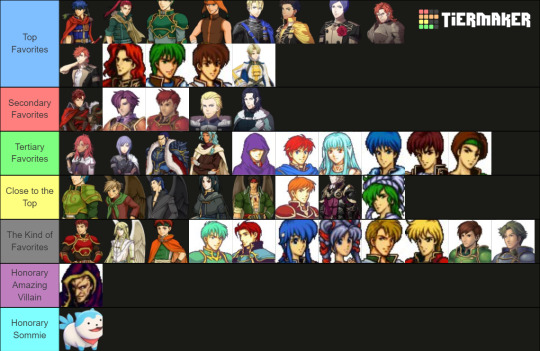
These aren't actually in a specific order (so I don't necessarily like the character listed first in that tier more than the others there and may even like others on that tier more), but I just arranged them by series per tier.
That's not to say I don't also have love for other characters, because there are plenty I do enjoy a lot. This is just my like, top of the top.
Also, just because there are no characters from a certain game doesn't mean I'm not familiar with the game, but that I'm just not fond enough of anyone in the cast for them to have made this list.
My "kind of favorites" are like... not really at the top but I can definitely say I'm way more fond of them than the characters that didn't make the cut. It's like, a big gap in my affection toward them and those who didn't get on the list at all.
Sadly not many ladies got in because IS sucks at writing women 9.5 times out of ten, they don't interest me, and/or the men are written so much better that they interest me way more.
Normally with tier lists I end up basing it on how well characters are written, the depth of their character/stories, how well they're integrated into things, how they are as a unit, etc. In this case it's just my pure personal biases with no strings attached.
Now that I think about it though, if Lyon is supposed to be my favorite character in FE8, why is Seth the only character I listed? 🤨🤨🤨 Perhaps I need some introspection on this...
tellius is littered all over this thing lmfao
#DCB Comments#DCB Tier Lists#I don't think I even tagged any of my old tier lists as tier lists so guess I'll start with this one?#also i didn't mean to put kain and noish side by side like that and now i'm like lol they look kinda similar#meanwhile i put ike at the front of the top row bc like. you know. it's ike.#maybe i shouldn't have put my mans right next to him bc he wouldn't like that but oh well too late#anyway these are the ppl you are most likely to see me gushing over#edit: oh yeah holsety would be secondary favorites if he was here
2 notes
·
View notes